Here’s Why Biden’s Latest LGBTQI Memorandum Should Be Ringing Alarm Bells
On February 4th, the Biden Administration released a Memorandum with the goal of “advancing the Human Rights of Lesbian, Gay, Bisexual, Transgender, Queer, and Intersex Persons Around the World”. This Memorandum is building off the Obama Administration’s Memorandum of a similar nature. If this isn’t already ringing alarm bells, let me take you through it.
The Memorandum starts by asserting inherent human dignity, and a few items on the Memorandum support that: Section two talks about increasing protections for LGBT asylum seekers and training Department of State and Homeland Security personnel to meet the needs of Queer asylum seekers. While those could seem like great things on paper, training violent agents of the state to respect pronouns is not going to prevent them from being violent. Not to mention, I’m not sure what kind of training a government that still doesn’t support it’s queer community could give.
The problem in the first place is the carceral system, adopting its nature for asylum, and state violence. Section one suggests that the Department of State report the abuses experienced by LGBTQ people globally, but then connects this report to Foreign Assistance. Section three reaffirms that, “agencies involved with foreign aid…should consider the impact of programs funded by the Federal Government on…the rights of LGBTQI+ persons, when making funding decisions.” This memorandum is suggesting that we penalize countries for criminalizing sexuality by reducing access to aid. Not only is this repugnant, queer people living in a country that criminalises sexuality or expressions of it — like my birth country Nigeria — will be economically disadvantaged. Additionally, they might be restricted from local aid on account of their sexuality. The Biden administration would be cutting people off from one of the few resources they have access to.
Section four blatantly threatens, “financial sanctions, visa restrictions, and other actions” as appropriate responses. The vagueness of the power — military and economic — the administration is foisting on itself is scary, since we already know what US intervention looks like historically and now. And yes, it is power that Biden is operating from. A narrative of imperialism and supremacy that not only places the US in a saviour role, but furthers harm by refusing to acknowledge the U.S.’s responsibility. The language Biden uses places this memorandum as a reclamation of the United States’ positionality, at ” at the forefront ” of the fight for LGBTQI equality worldwide. This is a misrepresentation of the truth. A lot of the legislation around the world today is tied to colonization, and in places like my country Nigeria, and other African countries – homophobia is imported. This is not to say that Africans aren’t homophobic, but that the language around homophobia and the way it functions is rooted in colonial systems. The criminalisation of homosexuality is tied to British Victorian laws, and continuing on in their spirit, newer laws in Africa are influenced by American Evengelican Christianity.
In Uganda, “US Christian groups have since spent millions on schools, hospitals and orphanages” which allow hate ministers like Mike Bickle, Scott Lively, and Lou Engle to export their homophobia as religion. The rhetoric they push is common in Nigeria as well. Growing up, I watched my father learn the language that these ministers use. They ascribe monstrosity to queerness in ways that would be familiar to Americans, but was foreign and jarring on my fathers tongue: that queer people functioned as a cult out to recruit, turn, and harm people. This rhetoric links queerness to yet another way that African agency over identity and culture will be taken. The Biden Administrations choice to respond to the treatment of Queer people globaly through threats, is their choice to operate through the same oppressive dynamics that some Africans are trying to reject when they reject queerness.
Rather than that, Biden could take stronger stances against Homophobia in the US by calling hate ministers like Mike Bickle into account. Biden could expand on aspects of the memorandum that call for communal work, and amplify the resources of queer organizations globally. Africans are best suited to fight for the rights of queer Africans, not the Biden Administration. Rather than train prison guards to be less homophobic or transphobic jailers, Bidens Administration could do away with a system that incarcerates people and focus on providing housing, safety and stability. It is important to push back against the narrative that we are being fed of America as a champion. We need to examine who it serves.
This is how power works y’all. White supremacist power. Biden is channeling an American identity of supremacy, masked as leadership. America — the country — is a White Settler Nation, and it has never been anything but. The world outside of America is not just countries of people that need saving and there is no hypothetical past to return to that would make that saviour narrative real. It just obscures harm. The world has seen what American intervention looks like. The world is tired. If the US does seek to play a role in the global fight for human rights, it should be one of truth, where the government acknowledges our harm, and accountability, where we fix what we broke.
Support Independent Queer Media
We’re raising funds to make it through the end of July. 99% of the people who read this site don’t support. Will you be one of the ones who do? Joining A+ is one of the best ways to support Autostraddle — plus you get access to bonus content while keeping the site 99% free for everyone. Will you join today?
Where Do We Go to be Queer, Nigerian and Alive?
The Nigerian Special Anti-Robbery Squad, SARS, purportedly handles cases related to kidnapping, theft and assault, but any Nigerian knows SARS has overreached its authority almost since its conception in 1992. In actuality, SARS functions as a tool of the government to subjugate Nigerians. Which is why Amnesty International recently sanctioned the squad after their investigation revealed “at least 82 cases of torture, ill treatment and extra-judicial execution by SARS between January 2017 and May 2020. ” The same report states that Amnesty international “has documented 15 cases where SARS officers arbitrarily confiscated suspects’ property.” SARS officers extort money and resources from Nigerians under the guise of suspecting them of theft or fraud. They don’t stop at that. Like the Amnesty report details, SARS uses the law as a guise to entrap people, and subject them to torture.
The #EndSARS protests that began in October address grievances against SARS but also the entire Nigerian police and government. The systems and people that allow for police officers to torture humans without being held liable aren’t limited to SARS. For queer Nigerians, like Matthew Blaise, the danger is greater. The Nigerian Same Sex Marriage Prohibition Act (2013), which criminalizes “same-sex” marriage, and any queer organizations in Nigeria, provides a basis for harassment by the police. Queer and gender non-conforming Nigerians are more vulnerable to threats and extortion because they can legally be targeted for their sexuality or gender presentation.
On the 20th of October, Lagos State Governor, Babajide Sanwo Olu enacted a 4pm curfew despite the heavy traffic caused by people returning from work, and the protests. There are reports that electricity in Lagos was shut off, and bridges and roads were sealed off. In Lekki, soldiers shot at and killed several people despite exits being blocked off. This instance of military violence is being referred to as the Lekki Massacre.
Nigerians deserve to be safe. Nigerians deserve a government that takes into account the needs of the country. One that doesn’t use the lives of its people to play games. Queer Nigerians deserve laws that protect them from abuse instead of making them vulnerable to it. On October 11th the Nigerian Government claimed that SARS would be disbanded, in favour of a new team, SWAT. Rebranding does nothing to address the deep rooted issues of corruption that create cycles of violence and oppression in Nigerian society. It does not mean accountability for politicians whose financial abuse motivates egregious acts by the police. Rather, rebranding is power doing what power does and shifting to a new form to continue an old thing.
The protests are part of a fight for sovereignty. For queer Nigerians, this means not just divesting power from the talking heads of imperialism that are the Nigerian government, and their goons, the police, but denying colonial era limits on our being that are as foreign to us as the Nigerian police.
The actions of the Nigerian government in Lagos, Abuja and other protest sites do not indicate goodwill but a willingness to act against the people with impunity. The government’s attempts to turn off communication and silence the people are equally transparent attempts to hide their actions. What is going on in Nigeria is not disconnected from the interests of white supremacy and empire globally, and especially in America.
This year has been met with several protests globally that seek to address the failures of government. Our stories are not separate. Our marginalisation is connected, and so our revolution must be as well.
My mother says it is the “same spirit that is in all these people,” and she’s right. In the police, I see the spirits of greed, malice, and cowardice. I see the shadow of white supremacy that hovers over my country and denies it sovereignty, keeping power in the hands of people that bend to it.
The Nigerians protesting — my friends — have different spirits. Community, love, strength and survival. I think it is the duty of the global community to honor these protests to the fullest extent we are able. What this means is donating to organizations like the Feminist Coalition for bailouts and other protest expenses. It means magnifying Nigerian voices, particularly queer Nigerians in Nigeria. It involves holding your government accountable. The silence of international governments in the face of this violence enables it to continue. Visa bans like the immigration ban Donald Trump placed on Nigeria, continue to deny the lived realities of Nigerians, and endanger queer Nigerians seeking asylum. Use whatever social media you have to raise awareness. The Nigerian government’s attempts to shut down signals show that they want to hide as much as they can.
Soro Soke, speak up. Our voices and our actions now matter.
Extra! Extra!: The Harrowing and Hopeful News about COVID-19 Around the Globe
This week’s Extra! Extra! COVID-19 offers a case-by-case look at how the pandemic is playing out in different parts of the world. With confirmed cases in most countries around the world at this point it is, obviously, impossible to be comprehensive. Below is a smattering of articles that I found to be thought-provoking, interesting and informative about how the crisis is unfolding in different places and the measures being taken by individuals and governments to address it (or, in many cases, not). Please join the conversation with stories from around the world that interested you in the comments.
To Start, a Bird’s Eye View (From a Bird That Needs Glasses)
The Stark Differences in Countries’ Coronavirus Death Rates, Explained
Everything we will ever know about this pandemic will always be fuzzy and incomplete. This isn’t one of those “humanity can never truly understand nature” type of philosophical statements. The vast, vast majority of countries have under-tested for COVID-19. (Truly the exceptions to that can probably be counted on one hand.) This article from Vox talks about the different case fatality rates we’re seeing for COVID-19 around the world – a measure of how many people will die from the disease. While some of the variation that’s being seen in the case fatality rate can be explained by population characteristics (most notably age) as well as country wealth, one of the biggest factors is the extent to which a country has been testing people for the virus. If you don’t have an accurate count of how many people have the disease, it’s impossible to have an accurate fatality rate.
But another factor here is, of course, the politics of it. Politics is what has driven which countries are testing, to what extent and what they’re doing with that information. The articles below offer some case studies on that.
Countries that Took This Seriously from the Start
How South Korea Reined In The Outbreak Without Shutting Everything Down
Taiwan’s Coronavirus Response Is among the Best Globally
South Korea, Taiwan, Hong Kong, and Singapore have been lauded for containing COVID-19. So much of this has to do with testing, contact tracing and quarantine, which is how the SARS pandemic from 2003 was ultimately managed. As both of these articles mention, it’s no coincidence that some of the countries that were worst hit by SARS were quick to act in response to COVID-19: the threat of Coronavirus wasn’t abstract for them. In response to SARS, the Taiwanese government established the Taiwan National Health Command Center, or NHCC. (Contrast that to the Trump administration which, in 2018, cut the unit responsible for preparing for a pandemic on the National Security Council – although he wasn’t the only US president to de-prioritize federal preparation for pandemics.) The NHCC was quick to implement containment measures as soon as the threat of the virus became clear in China. This, coupled with a strong, universal health care system, has helped a country in such close proximity to China to manage the spread of the virus while others across the world have failed to.
In addition to extensive testing, South Korea harnessed tech to aid in the containment, going so far as to use data from surveillance cameras, cell phones and credit card transactions to trace contacts of people who tested positive. This raises several thorny questions about privacy and government control. But when I consider that private corporations like Facebook, Google, Amazon, Apple and now Zoom have mines and mines of my data (which is being used in all sorts of dubious ways) the idea of governments using the same sorts of information in the interests of public health suddenly feels less threatening to me. (Also, let’s be real, the US is also a massive surveillance state, and I think we would be hard pressed to find a country that isn’t.)
A German Exception? Why the Country’s Coronavirus Death Rate Is Low
Over in Europe, Germany may not have been as successful as some East Asian countries in containing the virus, but it’s a model for how it’s responding to the situation, with one of the lowest fatality rates in the world. That’s a combined result of extensive testing, a strong health care system and reliable leadership at the helm during this crisis.
How Can You Social Distance When You Share a Toilet With Your Neighbor?
And in Africa, South Africa moved swiftly to roll out testing and impose a lockdown in ways that so many countries have failed to. But with a fraught history between law enforcement and civilians, these measures come with great risk; indeed there are already recorded incidents of police brutality. There are also substantial concerns about the disease spreading into some of the poorest parts of the country, which have weak infrastructure and lower quality health care. As South African author and journalist Mark Gevisser writes, “The AIDS crisis in South Africa taught us that the severity of an epidemic is linked to social determinants such as poverty, gender inequality and violent conflict.”
And Then, the Countries That Did Not…
In an era of rising populism and xenophobia, the pandemic lays bare our common humanity in at least this area: our collective inability to prioritize life over political games, social divisions and capitalistic concerns. There’s a lot – too much really – to say about the politics behind each of these governmental failures, so I’m not even going to try to give an overview of that. Instead, I’m going to focus on just a few case studies in how the pandemic has exacerbated pre-existing political issues.
If you read one article from this round up, let it be this essay by Arundhati Roy where the master of fiction and political writing draws a line from America to India with COVID-19 marching every step along the way.
+ The Pandemic Is a Portal
While the pandemic is testing weak governments, it also presents challenges to the important political movements that were happening in response to those governments. For instance, consider the situation in Algeria.
+ Coronavirus in Algeria: A Country’s Last Warning
Nonetheless, activists and opposition party leaders are using this moment to continue to call out the failed leadership in their countries, as in Brazil, for instance.
+ Brazilian Left Demands Bolsonaro Resign over Coronavirus Response
Back in the US, we know that the effects of this pandemic will be felt differently by race and region.
+ How Racial Health Disparities Will Play Out in the Pandemic
+ Early Data Shows African Americans Have Contracted and Died of Coronavirus at an Alarming Rate
+ The Coronavirus’s Unique Threat to the South
+ U.S. Latinos among Hardest Hit by Pay Cuts, Job Losses due to Coronavirus
And the effects of US foreign policy continue to make volatile situations even worse, as Tehran’s Mayor explains. Indeed the UN High Commissioner for Human Rights as well as 60 Spanish organizations have demanded that sanctions be lifted worldwide in response to the crisis.
+ Sanctions Are Crippling Iran’s Fight against Coronavirus
And Then There Are the Peoples and the Places Which Have Few, If Any, Options
As I read news about the pandemic, I’ve been increasingly concerned about what will happen when the disease hits people who are already trying to survive the ravages of war, genocide and extreme poverty. These are some of the most vulnerable people who – even in the face of all the tragedies that have been distributed among the wealthier parts of the world thus far – will truly bear the brunt of the pandemic.
+ Refugee Camps Face COVID-19: “If We Do Nothing, The Harm Is Going To Be So Extreme”
+ Yemen’s Civil War Will Make the Coronavirus Even More Dangerous
+ “A Ticking Time Bomb:” Scientists Worry about Coronavirus Spread in Africa
+ A Remote First Nation Prepares for Its Most Daunting Challenge: Limiting the Spread of Coronavirus
This is the point at which I have to stop reading the news.
A Few Glimpses of Hope
In spite of this nearly-worldwide failure, there are still stories to be found of people who are supporting each other in the face of their governments’ shortcomings (to put it nicely). Here are just two examples from the UK and Moscow:
+ A Different Kind of Anarchy in the U.K.
+ Meet the Activist-Doctor Who Has Become the Kremlin’s Loudest Coronavirus Critic
And Finally, a Memorial
There are so many things that make COVID-19 and this pandemic so devastating. Perhaps one of the most heart-wrenching is the knowledge that so many people are, not just dying from this disease, but they are dying alone. Their loved ones cannot even hold proper memorials and rituals to process their own grief because of social distancing.
This past Saturday, China observed a national day of mourning to honor those lost to COVID-19.
“When Sirens Went Off, I Began to Cry”: China Mourns Virus Deaths
Extra! Extra!: Conservative Supergroups and Progressive Campaign Organizing, Oh My!
This week’s Extra, Extra! brings you some reflections on the 2020 US election (not the primary!) from our beloved political writer and 2020 Democratic Debate Recapper Natalie, more disheartening immigration and LGBTQ+ news, conservative organizing, a new progressive campaign arm from AOC, and an update on the Wet’suwet’en land protectors.
Election 2020
Ginni Thomas Plans New Conservative Supergroup to “Protect President Trump”
Natalie: Last week, Justice Sonia Sotomayor issued a scathing dissent in Wolf v. Cook County. The case greenlit the administration’s “wealth test” for immigrants which forces them to prove that they won’t need any kind of public assistance. Writing for herself (not the Court’s other liberal justices), Sotomayor accused the Government of crying fire and the conservative majority of rushing to put it out, in the absence of any smoke. She was right, of course, but acknowledging that truth earned her calls for recusal from the president and scorn from conservatives. Oddly, though when this news dropped — that the wife of Court’s conservative stalwart was creating an organization to carry water for the president — ostensibly proving Sotomayor’s point, those conservative voices didn’t have much to say.
The destruction of our democracy is happening because the American people have lost faith in our institutions and Ginni Thomas’ efforts only hasten that erosion. Chief Justice Roberts, who has long been concerned about the public perception of the Court, cannot allow this rampant politicization to continue.
Himani: I’m just chiming in here to say that I have no faith in John Roberts.
Ocasio-Cortez Builds Progressive Campaign Arm to Challenge Democrats
Natalie: I am a great fan of Rep. Alexandria Ocasio-Cortez. She is brilliant and has an unparalleled ability to explain the most archaic and convoluted policy in a way that makes sense to ordinary people. Her win over Joe Crowley in the NY-14th will go down in history as one of the greatest political upsets in history. But for all her skills, she does not have a good track record at picking winning candidates. We saw this in 2018: either her preferred candidates lost in the primary (like Brent Welder in the KS-03 or Abdul El-Sayed in Michigan) or they lost in the general (like Jason Thompson in KS-04). As easy as it is to cast aspersions at the Democratic campaign committees, picking viable candidates in unfamiliar districts where the ground is always shifting is difficult… and AOC’s track record reflects that reality. Given that, I approach news of her creating this new PAC with a bit of trepidation.
That said, I’m encouraged by her early picks which, with the possible exception of Cristina Tzintzún Ramirez in Texas, strike me as reasonable picks. Jessica Cisneros (TX-28) and Marie Newman (IL-03) are running against incumbent Democrats but are still garnering support from across the Party. Kara Eastman narrowly lost her race in Nebraska in 2018 and lots of Democratic groups, both “establishment” and not, have lined up beside her in a rematch. I was encouraged to see Georgette Gomez, a member of the San Diego City Council (and lesbian!), among AOC’s first round of endorsements. Gomez trails in the CA-53 polls but with a lot of voters still undecided and given the way her opponent is Bloomberging her way through the primary using her grandparents’ fortune, it’s hard to disagree with the choice. Hopefully these picks reflect a more deliberate AOC as she looks to attract more progressive allies to Congress.
Immigration
How Stephen Miller Manipulates Donald Trump to Further His Immigration Obsession
Himani: Last week, Rachel gave us a detailed update on immigration, and this article from The New Yorker is a fascinating account of how one administration official has been the lead of pretty much all the awful immigration-related actions done under Trump.
Immigration news this week continues to be grim. The Department of Justice announced it’s created a section devoted to pursuing denaturalization cases. Denaturalization isn’t unique to this administration, but those cases have been pursued much more aggressively under Trump than they were previously. I’ve been disappointed in most of the articles I’ve read this week about the denaturalization section because they continue to parrot the DOJ’s stance that denaturalization is about bringing criminals to justice. Shirin Jaafari, writing for PRI in 2018, provides a more nuanced look at how denatrualization was handled in the past, and last October, writing for The American Prospect, Amanda Frost provided context on the ridiculousness of denaturalization proceedings in the last few years that, nonetheless, went through.
LGBTQ+ Rights in the US
Kamala: In case you were feeling comfortable in your queer skin today, let us shake you up a little. The latest news on LGBTQ+ rights continues to reflect the unusefulness of the law to let people live their truths and actually provide protection to queer and trans people.
The Fight Over Whether Religion Is a License to Discriminate Is Back before the Supreme Court
Kamala: We begin with a Supreme Court case, Fulton vs. City of Philadelphia — featuring the enemy of women, Brett Kavanagh — that will decide whether religious freedom entitles organizations who contract with government organizations have the right to discriminate against same sex couples. “[Catholic Social Services] claims it has a First Amendment right to continue to do business with the city even if it refuses to comply with the city’s anti-discrimination rules.” I’m sorry, no, that’s not how rules work?
Trans, Imprisoned — and Trapped
Kamala: There are stunning and devastating narratives and visuals in this piece on the sexual violence and other hardships experienced by the MANY trans people who are being held in the wrong prisons.
Idaho Bill Will Send Doctors to Prison for Life for Treating Trans Kids
Kamala: This bill in Idaho, not unlike last week’s in South Dakota, is the most extreme version of these bills that’s been introduced at a state level. It aims to make it a felony for medical professionals to help minors access medical care that affirms their genders, like puberty blockers and hormone therapy, and includes a penalty of life in prison. Again, these are treatments which many people have testified saved their lives.
The voice of reason here, that’s apparenlty being ignored: “Parents of transgender children, like most parents, simply want what is best for their children, which includes working with physicians to ensure that their children are provided with the most medically appropriate treatments,” ACLU of Idaho Policy Director Kathy Griesmeyer said in a statement. “It is not the government’s role to be involved in this process.”
BUT! One bright gem to end on a high note, the Transgender Law Center has a recent win to share: Chin One Step Closer to Home
Wet’suwet’en Nation Land Protectors Arrested
Rachel: In an ongoing effort to stop the construction of a natural gas pipeline across unceded land, Wet’suwet’en Nation members have been camped out as a blockade at a site in northern British Columbia; this week saw the RCMP begin to arrest the protectors in an effort to begin pipeline construction. The conflict stems from a disagreement about whether access has been granted by the Wet’suwet’en to build the potentially hazardous and dangerous natural gas project on the land; although the pro-pipeline forces claim that Wet’suwet’en leadership granted them permission, the protectors and their allies say that while some band councils granted their agreement, hereditary chiefs did not, and the nation as a whole hasn’t consented — you can read more about the legal groundwork here at First Peoples Law. From CTV News:
Indigenous advocate Pamela Palmater notes that the occupation of traditional territory is “fully within the legal right of the Wet’suwet’en,” noting that the RCMP’s use of force is concerning. “These shouldn’t be viewed as anti-pipeline protests. These are really demonstrations by Indigenous people all over the country to say we don’t want the government using the RCMP to violently take down people who are living on their own territories,” Palmater said during an interview Monday on CTV’s Your Morning.
Himani: As new oil and gas pipelines continue to degrade the environment and infringe on the sovereignty of indigenous people, the devastation wrought by climate change continues around the world. One recent example is the locusts swarming in East Africa, putting the food security of millions of people at risk.
Updates from the Wars in the Middle East
+ America’s Failure in Afghanistan, Explained by One Village
+ Syria’s Worst Humanitarian Catastrophe in Its Nine-Year Civil War Is Now Unfolding
Islamaphobic Violence in India
+ “They Dragged Me By My Beard”: Survivors Recount the Mob Violence in Delhi
COVID-19
+ “We Are at a Turning Point”: The Coronavirus Outbreak is Looking More Like a Pandemic
+ Iran’s Leadership Rigs An Election — And Still Loses
Himani: Iran’s election was already on course to be questionable at best (the regime disqualified half of the candidates who were running). But it also coincided with the Coronavirus outbreak in Iran.
+ Three Reports from Female Inmates at Hong Kong’s Prison Mask Factory
+ What Happens If You’re Critically Ill In China — But Not With Coronavirus
Northern Ireland Makes History, Decriminalizes Both Abortion and Same-Gender Marriage
In a historic first both abortion and same gender* marriage have been decriminalised in Northern Ireland. While the rest of the UK decriminalised abortion in 1967 — albeit under specific and restrictive circumstances — Stormont, the devolved Northern Irish parliament, rejected The Abortion Act, choosing instead to keep a total ban in place. In recent years it was liberalised slightly to allow for abortions prior to nine weeks if the life of the pregnant person was in immediate danger, but a penalty of lifetime imprisonment was still in place for any abortion conducted outside of these parameters. Similarly, though same-gender couples have been able to access civil partnerships in Northern Ireland since 2005, Stormont has blocked any attempt to open marriage up to them despite the Scottish and Westminster parliaments doing so in 2014.
Campaigners have been pushing hard for both sets of legislation for many years now, with 80% of the public backing abortion in at least some circumstances and 59% in favour of same-gender marriage. The last time same gender marriage was put to the vote in Stormant the ayes actually had it — but the DUP, Northern Ireland’s ruling party, vetoed the change using something called the Petition of Concern, a political tool designed to keep any one community from enacting discriminatory legislation over another, but which here was deployed counter to its purpose. Infuriatingly for many, these changes haven’t now come about due to any change in the DUP’s position but because of the historic failure of the Northern Irish parliament to successfully form a government. A condition of the Good Friday Agreement is that power must be shared between the two majority parties in Stormont, and as these parties have been unable to form an agreement for over two years now, power on many devolved matters has reverted to the central Westminster government.
The legislation came into force at Midnight on October the 21st as there is still no government in Northern Ireland. Prior to this deadline, the Northern Irish parliament had the option to vote it down as long as they were able to come to an agreement and reopen. While the DUP made an attempt to recall parliament to prevent this legislation passing the other parties refused to co-operate, with Sinn Féin referring to it as “a cynical ploy”.
While the first same gender marriage won’t be taking place in Northern Ireland until February 2020, and the government has until April to produce the regulations governing abortion, no one receiving an abortion in Northern Ireland, or any medical staff assisting them, can be prosecuted for it from this point onward. Travel to and accommodation in England, as well as the procedure, will also now be funded by the Northern Irish government for residents seeking an abortion abroad during this interim period. Comprehensive, age-appropriate and scientifically correct sex ed will also be introduced in Northern Irish skills under the aegis of these new laws.
*gender here refers to legally recognised gender which is not always concordant with the person’s actual gender identity.
Queer Journalist and LGBT Rights Activist Lyra McKee Killed in a Terrorist Incident in Northern Ireland
Lyra McKee, a 29-year-old journalist and LGBT-rights advocate from Northern Ireland, was shot dead on April 18 while covering a riot in Derry.
Her death, which rocked the journalism community, has been attributed to terrorists.
“Lyra was a ball of energy, passion and wit. To know her even a little was an inspiration. She brought intensity and integrity to everything she did in her too-short life,” Ina Fried, a journalist with Axios and Lyra’s friend, said. “She was also a proud and vocal part of the LGBTQ community and sought out older queer journalists. She wanted to learn from us but I learned so much from her — particularly what true dedication looks like. I wish that lesson hadn’t come with such a tragic exclamation point.”
Lyra was a promising investigative journalist as well as champion for LGBT rights in Northern Ireland, where she dreamed of seeing legalized marriage equality. One of her most-famous pieces is a letter she wrote to her 14-year-old self, published in The Guardian.
“Three months before your 21st birthday, you will tell Mum the secret. You will be sobbing and shaking and she will be frightened because she doesn’t know what’s wrong. Christmas will be just a couple of weeks away. You have to tell her because you’ve met someone you like and you can’t live with the guilt any more. You can’t get the words out so she says it: “Are you gay?” And you will say, “Yes Mummy, I’m so sorry.” And instead of getting mad, she will reply “Thank God you’re not pregnant.”
It was a clarion call to all the young LGBT kids that it was OK to be who they are, to love who they love, in a place that doesn’t make that easy.
On Valentine’s Day, McKee wrote about finding love and her love for her partner, Sara Canning, in the Belfast Telegraph.
“I realised that love isn’t just what you feel, it’s what you do when everything is falling apart and the person you love needs you. I have been so blessed, in my life, to have both felt that kind of love and had it returned tenfold to me.”
According to an BBC interview with Ciarán Ó Maoláin, the Belfast secretary of the National Union of Journalists, Sara was with Lyra when she died.
Lyra wrote for many publications, including BuzzFeed, the Atlantic, and Mosaic Science, and had recently signed a two-book deal with publisher Faber and Faber. Her book, The Lost Boys, about the disappearance of children in Belfast in the 1970s, is expected to be published in 2020.
Her work garnered international attention. Lyra worked as an editor for Mediagazer from her home in Belfast, and in 2016, Forbes Magazine named her one of the 30 Under 30 in media. Lyra also authored Angels with Blue Faces, a non-fiction novella about a cold case from the Troubles.
Lyra believed in people, and said so in her TEDx talk about LGBT equality, which she dedicated to the victims of the 2016 massacre at Pulse nightclub in Orlando, as well as LGBT people who have died of suicide.
In her talk, she said she believed that life gets better and invited anyone “uncomfortable with the thought of someone like me, please come up to me after this event and talk to me. I won’t bite your head off. I won’t call you a homophobe, we’ll just have a conversation and I’ll show I am human just like you.”
Twitter user Miriam Kennedy had an idea for a fitting tribute to this fearless journalist: “Once marriage equality is allowed in Northern Ireland, it might be called the Lyra McKee Act.”
A GoFundMe campaign has been set up in Lyra McKee’s name, to go to her family for funeral expenses and however else they see fit to share her legacy.
Amar a Muerte’s Juliantina Is Your New Favorite Queer Couple
If you’re a queer woman on the internet you probably already know about the new ship of dreams in town, but if you don’t, please allow me to introduce you to Juliantina! Juliantina is the ship name of Juliana and Valentina – a queer couple from the Mexican telenovela Amar a Muerte, which is, essentially, a story about love and destiny, with occasional turmoil and violence. What’s not to love about that combo!
The two women who encompass these characters, Macarena Achaga as Valentina Carvajal and Bárbara López as Juliana Valdes, take the show to another level. Their instant chemistry, from the moment they meet in episode 11, sets the tone for the entire telenovela. Destiny and ultimately the love that blossoms between the two supersedes, and transcends, the very idea of how love works! From instant best friends to lovers, Amar a Muerte get’s Juliantina’s story right! And for a Mexican telenovela to do just that is a feat in itself, since Mexico, like most Latin American countries, is very religious. To have a network put this kind of love story on air — not just as a ploy for ratings, but as an actual story line — is amazing.

Here’s a quick backstory of the two: Juliantina began as a friendship. Juliana is the daughter of a hitman who is on the run from the cartel that hired him. Juliana and her mom, Lupita, moved to Mexico, broke yet determined to get away from the cartel and to start their lives over. Valentina, is the daughter of a successful, rich, and powerful media mogul. Upon her father’s murder, she spirals into a deep depression with alcohol as her coping mechanism.
It’s Juliana who first sets eyes on Valentina. She’s walking with her mother, talking about finding a job, and right as they’re crossing the street, Valentina walks by with her very unsupportive, full of himself, selfish boyfriend, Lucho (but I digress). Juliana, immediately noticing how sad and despondent Valentina looks, can’t help but stare at Val. At this initial quick sighting from Juliana’s perspective, you can sense the beginning of an attraction. However, it’s not until the meeting in the park that the deal is really sealed.
Valentina is sitting on the bench, crying, lamenting over her father’s death and Juliana, remembering her from earlier, comes over and introduces herself. At that moment, the sparks fly. From their simple introductions to each other, you can feel the chemistry starting to emanate from the screen. The magic of their connection is palpable. From that point on, the audience knows that these two are something, that they are meant to be in each other lives, some way, somehow!
Throughout the show, Juliana and Valentina go through their ups and downs, some more ridiculous than others, as this is a sci-fi telenovela. They go through some real and honest times as well. Homophobia is tackled and brought to the forefront immediately. Amar a Muerte takes the time to deal with the topic. I found it particularly refreshing because it seemed genuine. And this coming from a telenovela was, to say the least, quite shocking to see.
Going back and re-watching the series, I kept revisiting Juliana and Valentina’s first kiss. Juliana’s mother had been kidnapped by the cartel who employed her father. Knowing the stress Juliana was in, Valentina invites her over to her house, to relax and go in the pool and to get away for a moment. As they’re in the pool, Valentina reiterates that this will be a good time to take Juliana’s mind off of what is happening. She asks her if she wants to practice her floating again (this was not Juliana’s first time in Valentina’s pool). Juliana reluctantly agrees and Valentina helps her stay afloat. She floats next to Juliana for a few seconds before a laughing fit ensues.
After they both come up out of the water, still laughing, Valentina has an intense look towards Juliana. They both pull closer to each other. They slowly make contact. The kiss starts off awkward before the connection quickly takes over! The entire scene is about two-and-a-half minutes, but the kiss only lasts for a few seconds. However, in those few seconds, nothing short of pure magic happens on screen. In that moment the show turns a major corner from being just another telenovela to being a major game changer in the telenovela world. I’m not sure the show or the actresses knew, at that moment, what they did and what was about to happen — the moment Juliantina became a worldwide sensation/phenomenon.

From the slow burn leading up to the kiss to the actual deed, it was by far one of the best first kisses by any couple I have ever seen on screen. It was nervous, slow, tentative, purposeful, intentional. It had so much meaning and power behind it. The very natural, organic way it unfolded was an art in itself.
In the end, Juliantina is not just another queer love story. It has layers. It was written with intention. Their love never comes off as forced or made to seem super sexual. And each kiss, each love scene is done with care and honesty. It all feels genuine and real and, in those moments, engages the audience in a way that makes it all okay, even if it’s not okay in their own lives. To see this on screen was very validating.
Both actresses, Macarena Achaga and Bárbara López, gave it their all with each scene. They left no doubt as to how they wanted to portray these characters: with love, realness, and honesty. It was beautiful to watch. And they are just as amazing off-screen as they are on screen. They’ve taken their roles in LGBTQ history very seriously. They are constantly posting support and love on all their social media outlets and the fans, myself included, have taken to them even more.
In the end, it all boils down to love. Having the freedom to love without labels. To be yourself. Juliantina did that for me. I don’t look at gender as a basis to decide if I am or am not going to fall for a person. Love without limits. Amar a Muerte and Juliantina gave that to me and I will forever be grateful for the show, the writers and these two amazing souls who portray this wonderful relationship.
Juliantina fans have started a campaign for a spin-off, which you can read more about here.
What You Need to Know About Jair Bolsonaro, Brazil’s Homophobic Presidential Frontrunner
Brazil is headed to a high-stakes runoff presidential election on October 28th that will have huge implications for the largest country in Latin America, perhaps even the world.
Far-right candidate Jair Bolsonaro, known for his ultra-conservative agenda and often compared to Trump, has polarized the country with his incendiary commentary filled with misogynistic, racist, anti-LGBT and anti-democratic views. His base of support was strengthened after he was stabbed in a failed assassination attempt on the campaign trail in September and spent most of the last weeks before the October 7th election broadcasting himself on Facebook Live from his hospital bed. He won 46 percent of the vote, just a few points shy of the 50 percent majority needed to win. Leftist Worker’s Party (Partido dos Trabalhadores) candidate Fernando Haddad trailed in second with just 29 percent of the vote. They both head to a runoff election on October 28th and the elected candidate will take office in January.

Fernando Haddad and Jair Bolsonaro
The presidential election is significant for many Brazilians, who have been facing political and economic crises. In recent years, Brazil’s economy has plunged into one of the worst recessions the country has seen, mostly due to huge corruption scandals impacting Brazil’s biggest companies and implicating many top government officials. Nearly a third of Brazilians have struggled to buy food in the past year and the unemployment rate is at an all-time high with nearly 13 million people without a job. In addition, Brazil faces a security crisis with its murder rate reaching unprecedented levels in 2017, rising 3 percent within a year, due to violence associated with organized crime and corruption.
On top of all this, many Brazilians have come to distrust the government, in part due to the downfall of former Brazilian president Luiz Inácio Lula da Silva and the questionable impeachment of first woman president Dilma Rousseff in 2016, both of the Worker’s Party (PT). Lula was very popular and a celebrated working-class president during his years in office from 2003-2011. He’s credited for creating a social welfare program that helped lift 20 million Brazilians out of poverty, increasing university access for black students and strengthening rights for housemaids. However, his administration has also been critiqued for perpetuating a system of bribery and corruption in order to keep the PT party in power. He hoped to make a comeback in the October elections but was barred from the race and is now serving a 12-year sentence on corruption charges which he is appealing in court.
Much like Trump, Bolsonaro has used his powerful social media presence to promise to fix these crises without proposing any real policy plans. For example, in September he tweeted: “While they insist on fallacies, labels and this fixation with the word ‘dictatorship’, more than 14 million people are unemployed, citizens are held hostage in their own homes, there are 60,000 homicides and 50,000 women are being raped each year. This is what the people care about! It’s urgent!”
Brazilian journalist Eliane Brum points out why Bolsonaro resonates with many Brazilians, and it’s very reminiscent of Trump and his supporters:
“Bolsonaro is less a post-truth phenomenon than a phenomenon of what I call self-truth. The content of what he says doesn’t matter: what matters is the act of saying it. Aesthetics have replaced ethics. By saying everything and anything, no matter how violent, he is labelled truthful or sincere by his voters at a time when politicians are being shunned as frauds and liars. At the same time, “truth” has become an absolute and a personal choice. The individual has been taken to a radical extreme.”
Here’s a quick overview of why Jair Bolsonaro is so dangerous for LGBTQ Brazilians, what’s been happening with the Brazilian presidential race the past few months and how Bolsonaro’s potential win could affect not just Brazil but the entire world.
Who Is Jair Bolsonaro?
63-year-old Jair Bolsonaro likes to paint himself as a political outsider but he’s been peddling the same ideas for a long time and is definitely not new to the political scene, having served seven terms in Brazil’s federal congress.
He’s a former military officer and has glorified Brazil’s former military dictatorship that held power from the 60s through the 80s. He said he was in favor of a dictatorship in a 1993 speech and in 2015, he was quoted as saying the military rule in Brazil was “glorious.” In 2016, Bolsonaro voted to impeach Rousseff and made a speech praising Colonel Brilhante Ustra, the man who oversaw the torture of hundreds under military rule, including Rousseff herself. Bolsonaro’s affinity for military rule has alarmed many Brazilians while others justify his position in the country’s security crisis.
Bolsonaro’s conservative agenda boasts support from the rapidly growing evangelical Christian sect, who believes in eliminating legal abortion and gay rights. Bolsonaro’s campaign has focused on safety and security, vowing to loosen gun ownership laws while also being hard on crime. He’s also in favor of developing the Amazon, the world’s largest rainforest and the world’s largest source to combat carbon dioxide emissions, which could lead to disastrous effects for the environment.
His whole deal is very reminiscent of Trump and it seems like he took a page from his playbook by dominating social media networks during his campaign, probably illegally using fake accounts on WhatsApp. He has 7 million followers on Facebook and 1.8 million Twitter followers, a third of which are suspected of being bots.
He’s Homophobic, Racist and Misogynist
Bolsonaro has a long record of spewing hateful speech towards women, the LGBT community, and black and mixed-race people in Brazil who make up more than half of the country’s population. In 2017, he had to pay a fine for hate speech and earlier this year he was charged with inciting hate by the attorney general. His violent rhetoric has spurred attacks from his far-right supporters, including one case where a woman had a swastika carved onto her body. And the Brazilian Association of Investigative Journalism reports more than 60 physical attacks on reporters committed in a political context.
These are just some of the things Bolsonaro has said that have encouraged this type of violence.
Disturbing, violent anti-LGBT comments
For context, same-sex marriage has been legal in Brazil since 2013 but in the last few years the LGBT community has seen a horrific rise in violent hate crimes towards them, including the assassination of prominent bisexual activist Marielle Franco. According to LGBT watchdog group Grupo Gay de Bahia, at least 445 LGBT Brazilians died from hate crimes in 2017, an astounding 30% increase from 2016. Luiz Mott, president of Grupo Gay de Bahia, told The Guardian that the rising violence is linked to the increasing prominence of ultraconservative politicians who align themselves with the evangelical caucus in congress. “It’s a discourse that destroys solidarity and equates LGBT people to animals,” he said.
Here’s how Bolsonaro contributed to the discourse:
+ In 2002, he threatened gay people with violence after seeing a photo of then-President Fernando Henrique Cardoso holding a rainbow flag in support of same-sex marriage. “I won’t fight against it nor discriminate, but if I see two men kissing each other on the street, I’ll beat them up,” he said.
+ In 2011, Bolsonaro told Playboy magazine that he “would be incapable of loving a homosexual son,” and adding, “I would prefer my son to die in an accident” than bring a man home.
+ In 2016, Ellen Page interviewed Bolsonaro for Vice’s webseries “Gaycation” in which he tells her homosexuality is a behavioral issue: “I believe that for the majority of gay people it’s a behavioral issue,” Bolsonaro continues. “When I was young, talking about percentage, there were few [gay people]. Over time, due to liberal habits, drugs, with women also working, the number of homosexuals has really increased.”
Also disturbing and violent misogynistic comments
+ In 2003, Bolsonaro was filmed arguing with fellow lawmaker Maria do Rosario. “I wouldn’t ever rape you, because you don’t deserve it …Slut!” he says before shoving her.
+ In 2014, he says the same thing again during a debate. He says a fellow woman congresswoman was too ugly to be raped. “She’s not my type. I would never rape her. I’m not a rapist, but if I were, I wouldn’t rape her because she doesn’t deserve it.”
+ He also told Ellen Page in that “Gaycation” interview that he didn’t care if she were gay because she’s pretty: “I’m not going to look at you and say, ‘I think you’re gay,’” Bolsonaro said. “That doesn’t matter to me. You’re very nice. If I were a cadet in the military academy and saw you on the street, I would whistle at you. All right? You’re very pretty.”
+ He has four sons and one daughter which he jokes resulted because of a “moment of weakness.”
+ He doesn’t think women deserved to get paid the same as men because women get pregnant and harm work productivity.
Racist views
+ He’s spoken terribly about indigenous and Quilombolas communities, who are descendants of Afro-Brazilian slaves, saying that “they did nothing,” implying that they were lazy. “I think they don’t even manage to procreate anymore,” he said.
+ In addition, he’s said indigenous communities would rather have “electricity, television, blonde girlfriends and internet” than conservation reforms.
+ In 2011, he responded to a question asking what he would do if his son fell in love with a black woman: “I won’t discuss promiscuity.” He continued, “I don’t run that risk because my sons were very well educated.”
The Movement Against Him
Rio de Janeiro, Brazil, September 29, 2018. Large protests of women in Brazil march at Cinelandia, against far-right presidential candidate Jair Bolsonaro, saying #NotHim.
Women in Brazil are mad as hell about Bolsonaro’s rise to popularity and his potential presidency, which has sparked a movement. Ludimilla Teixeira, a 36-year-old black woman from Salvador, created a Facebook group called “Women United Against Bolsonaro” on August 30 and within a few days 2.5 million women joined. Teixeira told The Guardian she created the group in order to coordinate protests against politicians with “misogynist, prejudiced and truly fascist” ideas. In September, Bolsonaro’s supporters hacked the group as well as the group administrators’ personal accounts and emails. Teixeira responded to the digital attacks with a call to protest against Bolsonaro.
On September 29th, thousands of women took to the streets of major Brazilian cities and declared #EleNão (#NotHim). According to organizers, 150,000 people marched in São Paulo alone.
But much like conservative white women still supported Trump even after the whole pussy grabbing tape blew up in the news, there’s been an increase in support for Bolsonaro from women.
His Opponent: Fernando Haddad

Lula was replaced on the ballot in September by 55-year-old Fernando Haddad after a court barred Lula from running. Former Minister of Education under Lula and Rouseff and former mayor of Sao Paulo, Haddad has an entirely different record with LGBTQ people than Bolsonaro. As Minister of Education, Haddad launched an anti-homophobic bullying initiative in schools that was eventually suspended by Rouseff. On the campaign trail, he pledged to be an ally for LGBTQ people and promised to criminalize homophobia and transphobia. He also plans to roll out a nationwide program like the one he launched in Sao Paulo in 2013 called Transcidadania, which helps transgender people complete their education and professional training.
Haddad currently trails behind Bolsonaro in the polls, 41 percent to 59 percent.
How Brazilian Straddlers Are Affected
Autostraddle commenter Carol Almeida is a lesbian journalist and Ph.D. cinema student who lives in Recife, in the northeast of Brazil. Almeida is concerned for herself and her community with the rise of attacks from far-right Bolsonaro supporters; she says many of her family members don’t see Bolsonaro as a threat to their lives and don’t take his hate speech seriously.
“I can’t hold my girlfriend’s hand in public now, and all of this happened too fast,” Almeida wrote in a comment on Autostraddle. “They want to kill us and although we’ll resist until the very end, it’s truly devastating having this feeling we’re about to enter another war in a continental country where millions and millions of people are voting against their own lives. I don’t wish this to anyone.”
She tells me over email the election season has taken a toll on her body; she’s been to the hospital twice in the last week due to pain all over her body from stress and anxiety and was given a fibromyalgia diagnosis while many of her friends are “experiencing distinct processes of depression.”
“I think this will be a very very dangerous country to all of us in the LGBT community,” she wrote in an email. “In addition to losing our rights, our greatest fear is that [Bolsonaro’s] government can trigger a process of violence against the community that won’t receive any type of punishment, since there will be no law to protect us.”
Almeida’s hope is that she and her community can survive the election outcome without losing their love for life. “I spent the day with some of my closest friends today and we made a pact to never give up.”
Lesbian Married Couple Battle South Africa’s Homophobic Dept. of Home Affairs Over Spousal Visa
Binational lesbian married couple Wendy Kessman, from the United States, and Nomfundo Ngidi, from South Africa, have been dealing with multiple complicated setbacks from South Africa’s Department of Home Affairs over spousal visas, in yet another example of same-sex couples being discriminated against by the South African government despite marriage equality being legalised in November 2006.
Wendy Kessman and Nomfundo Ngidi
The couple, who have been together since 2014, applied for a spousal visa for Kessman soon after their marriage in early 2017. Their application had been initially rejected as Home Affairs had claimed that Kessman had to return to the United States to apply. This claim contradicted earlier advice from Home Affairs that Kessman could apply for a spousal visa while in South Africa, following a 2016 High Court ruling challenging previous rules ordering foreign spouses to apply for and await decisions on spousal visas outside the country as it was deemed to be inconsistent with the Constitution.
In December 2017, after appealing the initial rejection, Kessman and Ngidi were surprised to find that their application for a ‘study visa’ was rejected, given that they didn’t apply for a study visa.
The couple has received support from South African LGBTI groups and media coverage by MambaOnline, a South African LGBTI lifestyle magazine to escalate their case. However, their case may be unsuccessful, based on a phone call from Home Affairs in the past week saying their application will be rejected again.
“It was a horrible call,” said Kessman, speaking to Autostraddle. “[The representative from Home Affairs said] we don’t understand the law, and what we were trying to do was not allowed because the people who our case’s precedence is based off of had different circumstances.” The couple that filed the lawsuit in the 2016 High Court ruling were heterosexual and had four children.
“It’s become apparent throughout that they don’t see us as a family,” Kessman adds.
South Africa’s Department of Home Affairs has come under fire from LGBTQ activists and community members for discriminating against LGBTQ people in their processes. They have rejected calls to remove provisions allowing marriage officers to refuse to marry same-sex couples, though activists were successful in stopping Home Affairs from forcing married trans people to divorce to obtain a change in their gender marker on documentation.
“There is a lot of anecdotal evidence that suggests that homophobia and transphobia plays a role in the process of trying to regularize a person’s stay,” says Matthew Clayton, Research, Advocacy and Policy Coordinator at The Triangle Project, which provides health, support, and other professional services to South Africa’s LGBTI community, such as clinics, counseling, and legal support for survivors of violence. Speaking to Autostraddle, Clayton noted that there is a lack of data on acceptance and rejection rates of spousal visas based on sexuality, and also points out that the issue seems to affect people regardless of country of origin or resources: “I know of lots of people from the US and UK, people who have the resources to hire lawyers and who have employers helping them who sometimes still are not able to stay in South Africa.”
South Africa has had a tenuous relationship with LGBTI people; despite being one of the first countries to call for protection of LGBTI rights, violence and discrimination is rife, especially towards Black lesbians and trans men.
“Currently the laws in South Africa are very progressive and affirming of LGBTI, but the general population have very different ideas,” says Kim Lithgow, founder of PFLAG South Africa, in an email to Autostraddle that also cited a survey stating that 80% of the South African population consider homosexuality to be “always wrong”. “The staff at Home Affairs are known to ‘lose papers/forms’ or drag their feet where possible. It all depends on the branch that you go to. Home Affairs have acknowledged that only a fraction of branches are willing to assist LGBTI in their affairs. It is part of a larger problem in South Africa.”
“The gap between rights and implementation of rights is significant,” adds Kessman. “We are proud of [the] rights we have as an LGBTI married couple, but if they are not implemented they are worthless. Just because you have rights does not mean you have justice.”
The visa limbo has caused significant stress to Kessman and Ndigi’s life, affecting their ability to work, study, or even undertake basic life skills that many take for granted. “It impacts everything — I can’t work, drive, open a bank account, leave the country, go to school, etc,” says Kessman, a researcher of LGBTI lived experiences in the region; she has been accepted for a PhD program based on her research but needs a visa to commence.
Support from family, friends, and community members (including civil rights attorneys, media, politicians, and advocacy organisations), as well as a writers group founded by Kessman are keeping the couple going. “Doing this kind of work allows for some freedom, and I keep in mind I don’t need a visa to write. But still the income is a consistent issue, we need to sustain ourselves through this emotionally and financially draining process. We need those that are willing to take a calculated risk on us, hire us, fund us. It doesn’t just contribute to documentation — it ensures we sustain this fight.”
Kessman and Ngidi are currently awaiting a written rejection from Home Affairs so they can escalate their case to the High Court, hopefully in the next few months. Due to the contradictory advice and long process times from Home Affairs, Kessman has already overstayed her visitor’s visa, which means she isn’t able to leave the country without being disallowed from returning.
“We have to stay and challenge it, and it is our right to,” she says. “We didn’t have a choice to overstay or not, and now we have no choice as to see it all the way through.”
Sunday Funday is Getting Hitched in Australia
Hello, scrumptious rock shrimp! I got a new pair of fleece leggings from TJ Maxx the other day and I’m so happy. Leggings as pants all year round! How are you keepin’ it cozy?
Alexandra Chandler is Running for Congress

Alexandra and her wife and kids (Via Alexander Chandler for Congress)
Alexandra Chandler is running for Congress in Massachusetts. When Alexandra Chandler transitioned on the job in 2006, she became the first transgender person to serve in the Office of Naval Intelligence. She’s also a working mom—she and her wife have two kids—and she’s running on family issues and economic issues. If she wins, she’ll be the first openly transgender person to serve in Congress!
Two Lesbian Couples Among the First to Legally Wed in Australia!
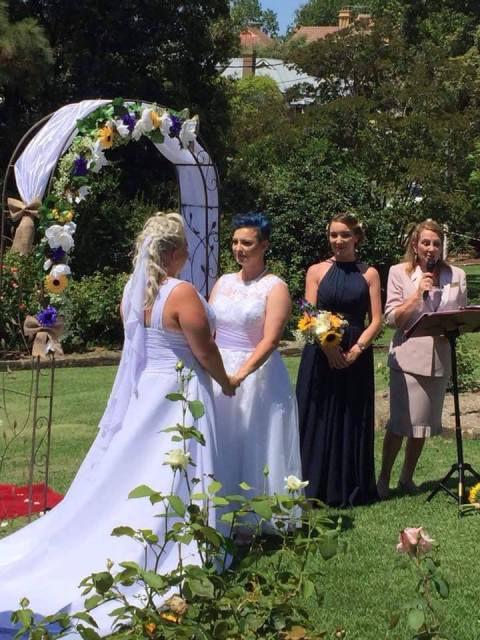
Amy Laker and Lauren Price were among the very first to get gay married in Australia. They’d originally planned to hold a commitment ceremony at the British consulate. But when the new marriage law was passed, they sought an exemption from the normal waiting period because Price’s family had already traveled to Sydney.
Another lesbian couple, Amy and Elise McDonal, wed a few hours later.
Here, Queer, Etc.

- Five Queer People on What ‘Femme’ Means to Them
-
Billie Jean King made being an openly gay tennis player much easier
-
Queer Rock Legend Sister Rosetta Tharpe Inducted Into Rock & Roll Hall of Fame
Here’s an otter for you!
http://www.instagram.com/p/BcyASKsltZY/
Fuel For Your Fire: LGBTIQ Activists From Around the World Share Their Stories
On Saturday in New York, LGBTIQ+ activists from around the world gathered to discuss the challenges and the solutions from the frontlines around the world at OutSummit. It comes on the heels of “Advocacy Week,” organized by OutRight Action International, where LGBTIQ activists from around the world meet with UN officials to discuss their priorities and demand accountability.
This is a very brief summary of a day filled with super important conversations — I strongly encourage you to look into these amazing humans, follow them, and learn more about the international fight for humanity.
Because I certainly can’t say it better than the 250 beautiful international changemakers, here’s a full dose of inspiration and fuel for your fire.
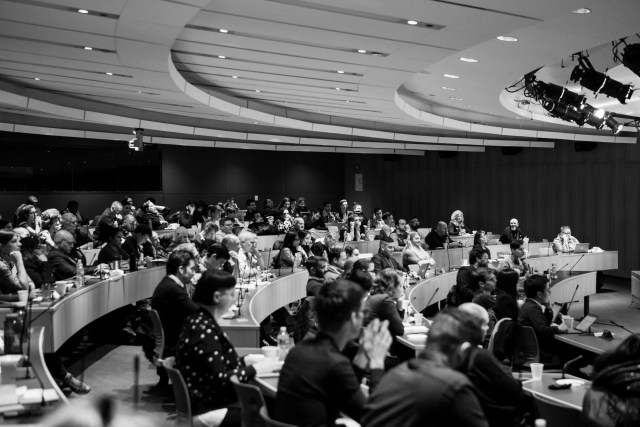
On why we do the work:
“People who weren’t like me [were] telling my story — I had to be in control of my narrative, my story.”
— Karamo Brown, American activist, television producer and host (catch him on the new Queer Eye coming to Netflix), and co-founder of 6in10.org on why he left a career in social work and psychotherapy.
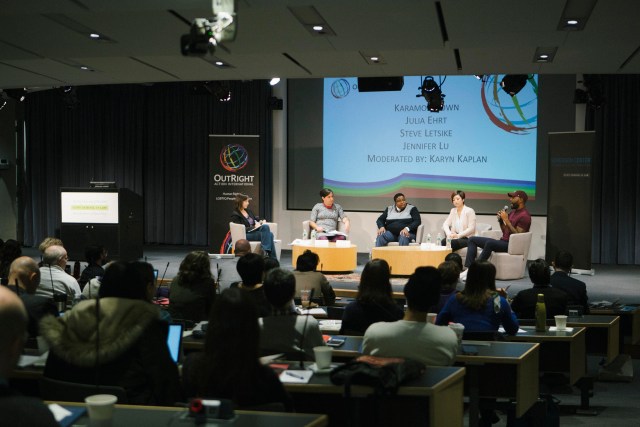
“The day I put on a skirt I vanished” – Julia Ehrt
“The day I put on a skirt I vanished — people like me were not anymore seen on TV. I grew up believing I was a white heterosexual male and sitting here today you can see how wrong you can be — and the day I came out I realized trans people are not in the news. They are not politicians, they’re nowhere to be seen.
I thought, well I am still the same person. I am still as smart and as dumb as I was before. The day I changed my gender it changed my life dramatically and I thought that was inappropriate. That’s why I started organizing”
— Julia Ehrt, Germany-based trans activist, human rights advocate, and Executive Director of Transgender Europe on why she has devoted her life to the fight
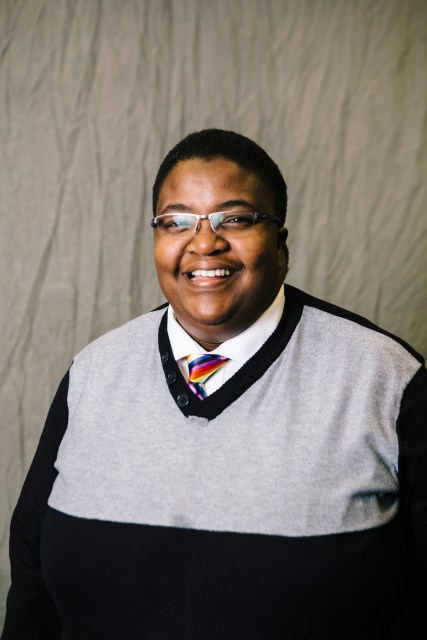
Steve Letsike
“Part of organizing [is] when you leave your township, when you leave your village, and come across many people that have gone through the same, you share that experience and you realize there is a problem and … that’s when when you start to unpack and say, ‘how do we address that?’”
– Steve Letsike, South African activist, feminist, leader, mentor, and human rights advocate, co-chairperson of the South African National AIDS Council, co-chair of the National Task Team established by the South African Department of Justice and Constitutional Development to address hate crimes and gender-based violence affecting LGBTI people, and Founding Director of Access Chapter 2
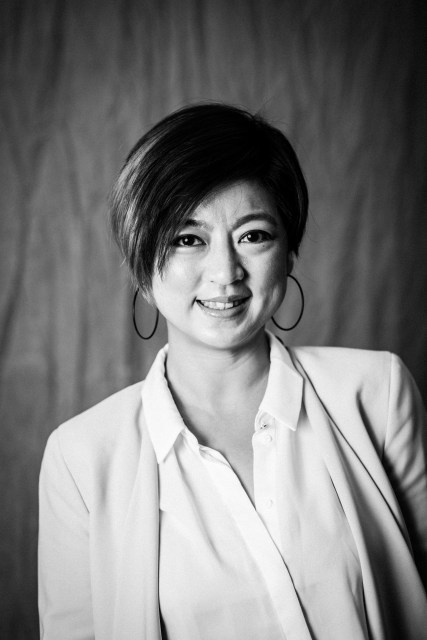
Jennifer Lu
“I love my country. I don’t want to leave my country. I want to live in my country with full equal rights.”
— Jennifer Lu, Taiwanese social worker, activist, writer, and political worker, Main Coordinator or Marriage Equality Coalition Taiwan, Senior Research Fellow at Taiwan Tongzhi (LGBTQI+) Hotline Association. She also ran for a seat in the Taiwan Parliament as Social Democrat candidate and raised the visibility of LGBT issues on the campaign trail in her fight to live in a country with full equal rights.
"Tolerance is not the same as acceptance. And tolerance is not enough." 👏🏽👏🏽👏🏽
-Vice Mayor Joy Belmont of Quezon City, Philippines at @OutRightIntl's #OutSummit— Voices 4 (@voices4_) December 9, 2017
Vice Mayor Joy Belmont of Quezon City, Philippines shows what local governments can do. Her flagship programs includes a Protection Center for Women, Children, and LGBT at the Quezon City Hospital and she helped Quezon City approve a “Gender-Fair City” ordinance which protects LGBT rights.
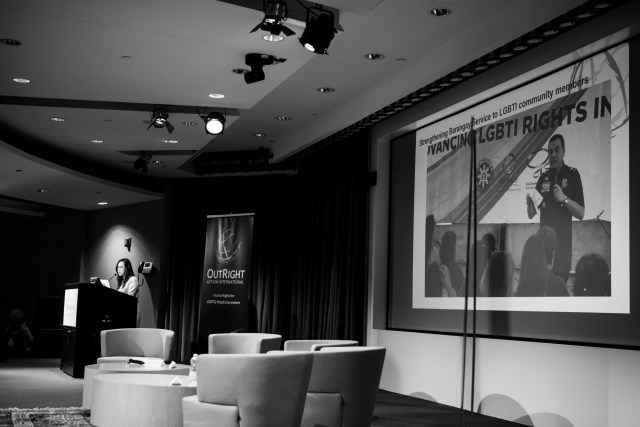
On the roles business plays in the fight for justice:
“Diversity and Inclusion are actually separate. Diversity is about inviting someone to the party. Inclusion is inviting them to dance. The company invites people to the party. The employees invite them to dance.” #OutSummit #Biz4LGBTI
— Jason (@jasaries) December 9, 2017
An important conversation was that of corporate pink washing — we in westernized countries have to remember that while we often raise a fight with corporate money, to many people fighting the good fight in developing countries these donations are the only lifeline to continue their programs. Nothing is entirely evil or entirely good.
“That is the irony of the work — you need money, there is no answer, there is no silver bullet there.”
— Aalap Shah, Member of the OutRight Action International Board of Directors, Senior Mobile Product Manager for Capitol One’s Digital and Innovation Lab. Shah has spent his career committed to social justice, financial inclusion, and public-private partnership specializing in marginalized communities’ access to income, markets, and technology.
On the media:
“Until the lion learns to write, every story will glorify the hunter.” Keynote on the #persecution of #LGBTQI people worldwide. #OutSummit
— Jason (@jasaries) December 9, 2017
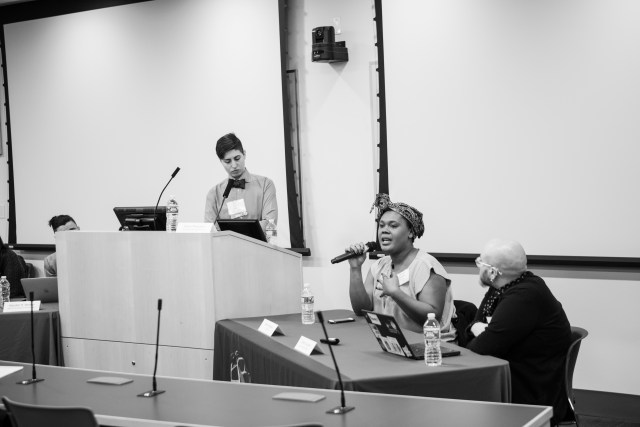
Tatenda Ngwaru speaking on the Global Intersex Rights Panel
“The reason why I keep on speaking is because I need the support of the media most importantly because people are familiar with things that are spoken about everyday and Intersex people are not shown on media platforms. I can barely recognize one person that stands as an intersex person who is shown as just a normal human being.”
— Tatenda Ngwaru, Zimbabwean Intersex Activist, Founder and former Director of the True Identity, the first intersex and transgender organization in Zimbabwe. She is now based in New York as an asylum seeker hoping to one day return to Zimbabwe and continue her work.
"We are all architects of a narrative and we can dismantle or challenge the dominate narrative" – @jpbrammer talking about media, representation and integrity at #OutSummit @OutRightIntl
— Adam Eli (@aewerner) December 9, 2017
On backlash and how to keep going:
“For every time there is success, for every time LBGTQI+ issues become a little more visible… when there is progress… when all these things happen there is backlash.”
— Grace Poore, Malaysian writer, documentary filmmaker, and Regional Program Coordinator for Asia and the Pacific Islands at Outright Action International where she oversees multi-country documentation and advocacy projects, conducts trainings on human rights documentation, and facilitates LGBT engagement with UN mechanisms.
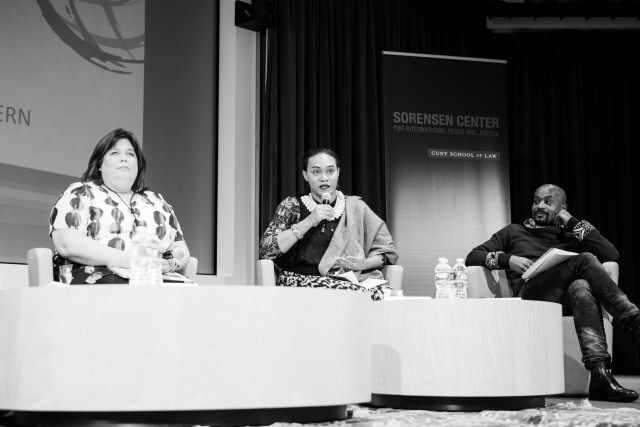
Kimberly Zieselman (Executive Director of InterACT), Miki Wali, and Eric Gitari on the Future of LGBTIQ Rights: Intersectional, Inclusive, and Courageous
“If there is backlash it means we are doing something right.” – Eric Gitari, human rights lawyer, queer activist, writer, Founder and Executive Director of the Kenyan LGBTI rights organization, the National Gay and Lesbian Human Rights Commission
If we’re not inclusive of the L, G, B, & T within our own community, those outside certainly will, intentionally or not, virtually erase entire groups. We’ve got to do better.
YES, @KaramoBrown, on visibility & inclusion. @OutRightIntl #OutSummit #OutSummit2017 #LGBT #LGBTIQ
— TJ (@tkriii) December 9, 2017
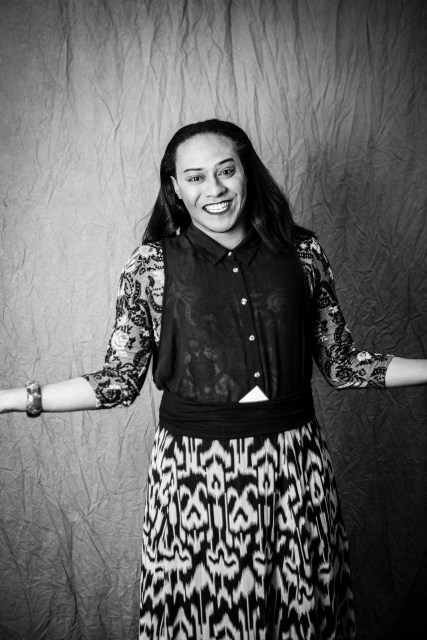
Miki Wali
“The reality is such, in the Pacific, we may be drowning, literally too, our islands are sinking but girl we’re fighting. That’s the reality — we’re constantly fighting. That’s why we go where the power is.
We’re there to remind our governments that there is an intersectionality of climate justice and gender. We’re there wherever conversations are taking place… We are there to present any form of manifestos or whatever we can to start this conversation. We may be angry, we may be pissed off because these conversations are quite f***-ed up but that’s the reality — we have to go where these powers are.
We need to systematically re-strategize our plans as we move forward — and coming into spaces like this where we can also find each other and hold each other’s hands and also hold each other.”
— Miki Wali, Fijian Trans and youth feminist activist, human rights defender, gender advocate, co-founder and Programme Support Officer of the Haus of Khalemeon, (the youngest) board member of the Pacific Sexual Diversity Network, former Executive Board member of the Fiji National Youth Council and the St. Piers Catholic Youth Wing, member of the UN Working Group on Youth and Children, first Trans activist from Fiji to attend the Commission on the Status of Women.
Australia Says YES to Marriage Equality
Note: The original version of this article published the wrong numbers for state votes. This has now been rectified. Also, one of the interviewees requested a change in name.
Amidst clouds of confetti, colored powder and cheering, Australians have overwhelmingly voted Yes to marriage equality.
The results of the marriage equality plebiscite, announced live by the Australian Bureau of Statistics on 15 November, showed that over 7.8 million Australians, or 61.6% of those who sent in their ballot, voted Yes. Every state and territory, including 133 of 150 Federal Electoral Divisions, held a majority Yes vote; the Australian Capital Territory recorded the highest, with 74% voting Yes (Victoria came a close second, with 64.9%). Around 79.5% of eligible Australians voted in the plebiscite. Women were more likely to vote than men, and those between 70 to 74 years old were the most likely to vote across age groups. The 18 to 19 age group, the youngest group of eligible Australian voters, were the most participatory amongst those under 45.
Australians by and large have been extremely celebratory of the result. “Today is an enormous relief, a great achievement for all Australians,” says Julie Tsinaris, a gay woman who works in security in Melbourne. Tsinaris was sad that the “love of [her] life”, who passed on 12 years ago, was not able to witness the result, “but I can feel her spirit. She would have loved this.”
Caketin Fairy, a Melbourne queer femme who “works in love”, shared similar sentiments. “I feel like the queers that come before us can hear this right now,” she said. “We do this for them, for us, for the queers that come after us.”
Ali Hogg, the convener of the Equal Love campaign that has fought for marriage equality since then-Prime Minister John Howard changed the Marriage Act in 2004 to only allow marriages between a man and a woman, is elated by the result. “It was so overwhelmingly a majority that it’s going to warn the Government that they cannot get away with discrimination,” she said.
Lesbian and student Hien Nguyen, while excited about the result, doesn’t feel like it was enough of a majority. “Only 61% voted Yes – that’s nowhere near enough,” she said. “It should have been 80%!”.
The voluntary non-binding vote, held via the Australian postal service from 12 September to 7 November 2017, has been the source of much controversy since before the July 2016 Federal Election, when the right-wing Coalition Government headed by Australian Liberal Party head Malcolm Turnbull promised a compulsory plebiscite on the legalization of same-sex marriage. Even members of Turnbull’s party were getting tired with the whole debacle, with senior frontbencher Christopher Pyne and senator Dean Smith publicly stating support for marriage equality. Legislation for the plebiscite bounced between the House and the Senate a few times until 9 August 2017, when the motion to discuss the plebiscite in the Senate was tied 31-31, resulting in defeat.
This defeat spurred the Government to go through the Australian Bureau of Statistics to survey every Australian on the electoral roll, arguing that there was no special legislation needed for this as it was already covered under laws governing ABS. This too was controversial, particularly due to its AU$122 million (over US$93.35 million) cost to Australian taxpayers (the issue had previously been allocated AU$160 million in the Budget). The Australian High Court heard two challenges against the postal plebiscite on the 7th of September, which gave some hope to LGBTQIA activists across Australia; unfortunately for us, the High Court ruled that the plebiscite was valid.
The marriage equality plebiscite has had both positive and negative outcomes. A record 98,000 people added their names to the Australian electoral roll primarily due to the plebiscite, most of whom are young people, women, and inner-city residents – tending to be friendly towards marriage equality. However, the LGBTQIA community has also had to deal with a significant wave of homophobic and transphobic messaging from the anti-marriage equality side, much of which didn’t actually target marriage equality specifically but went after the Safe Schools program, which provides LGBTQIA-related education and resources in Australian schools, as well as trans people, with charming comments such as political commentator Mark Latham’s claim that he “supports gay marriage but not state-approved gender fluidity”. (It’s worth noting that under current law in most Australian states, married trans people need to be divorced before they can have their sex recorded on their birth certificate.)
People on the YES side have worked furiously to counteract the NO side’s messaging, through regular events and rallies as well as grassroots marketing campaigns of their own. Melbourne-based jazz singer, cabaret artist, and community activist Mama Alto, a non-binary trans femme of colour who was recently recognised as Artist of the Year at the GLOBE Community Awards, has been documenting YES-side campaign art and posters around Melbourne, sharing it with her thousands of followers and friends on social media.
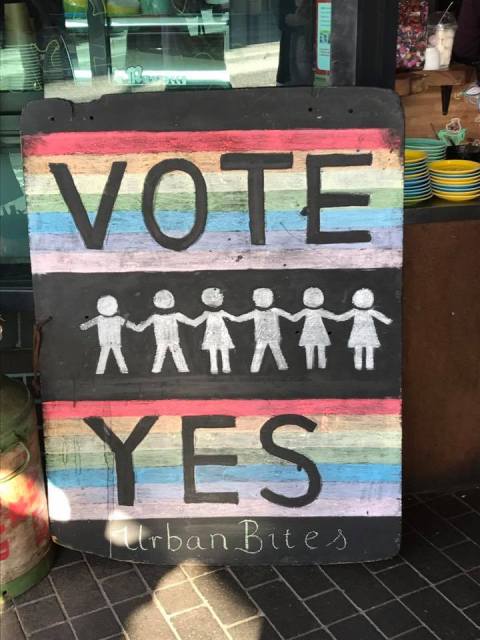
YES Campaign support ad – photo by Mama Alto
“I wanted to both capture the beautiful expressions of love, support and community, and also post these images online to spread hope and positivity,” she says, aiming to provide “a little beacon of hope” to those feeling overwhelmed and isolated by the extra focus by mainstream and social media on the NO campaign. She’s received positive feedback from people who say that after dealing with rough days of negativity and invalidation, “randomly coming across these quiet but powerful supportive statements that are out in the community can help them keep their head above water”.
Mama Alto notes that she’s primarily “amplify[ing] the hope and love that’s already out there”, but every little bit can help. “I know personally, as someone who experiences terrible mental health issues, sometimes you need things to cling to. Little lights in the darkness. They can turn your day around, or they can help you keep your head above water and survive for one more moment. And when your community is under siege, sometimes that’s all you can do: take it moment by moment.”
Even with the fervent YES campaigning and increased enrollment, there were still concerns leading up to the announcement about the results. An early November study by Griffith University in Brisbane, using similar data analysis methods that led to the prediction of Donald Trump as winner of the 2016 US Election, showed a narrow win for the No vote. Early reports of dumped voting envelopes and privacy concerns have also cast doubt on the validity of the survey results.
Even a Yes vote is not a guarantee. While Turnbull (who publicly urged Australians to vote Yes, much to the consternation of LGBTQIA Australians who don’t understand why he still wanted to push a plebiscite through instead of just legalising marriage equality already) has stated that a Yes vote will lead to marriage equality by Christmas, the non-binding voluntary nature of the vote means that the results would still be subject to much criticism, especially since there hasn’t been enough information on what percentage would count as ‘legitimate’. Indeed, former Prime Minister Tony Abbott has suggested that the anti-marriage equality campaign should keep going even after the vote is over, suggesting more traumatic times for Australia’s LGBTQIA community.
A couple of draft same-sex marriage bills have already been proposed by Liberal members Dean Smith and James Patterson. While both bills include provisions for “religious exemptions”, Patterson’s bill has come under immense scrutiny for provisions that would severely roll back anti-discrimination protections, including those unrelated to marriage, such as parents being given the right to pull their children out of Safe Schools programs in schools. In response to these bills, Hogg said that Equal Love will push the Greens, Labor, and independent Members of Parliament to call for amendments to Smith’s bill, calling any form of discrimination in the guise of religious freedom “despicable”.
While Australia celebrates a long-awaited victory, many are aware that this is not the end. “We can’t assume this is the end,” said one queer student I spoke with, to the agreement of many others.
“Marriage is one thing – it’s just the tip of the iceberg of true equality,” says Fairy, bringing up trans people, intersex people, Indigenous people, and people of color. “It isn’t over yet.”
We Went to Asia’s Biggest Pride March
All photos by the author.
I dipped into Taipei the last weekend weekend in October to join Asia’s biggest pride parade. It was only a short flight from Shanghai and unlike my friends who are Chinese nationals, I didn’t even need a visa or entry permit.
All I had to do was narrow down my selection of fisting-related t-shirts and I was ready.
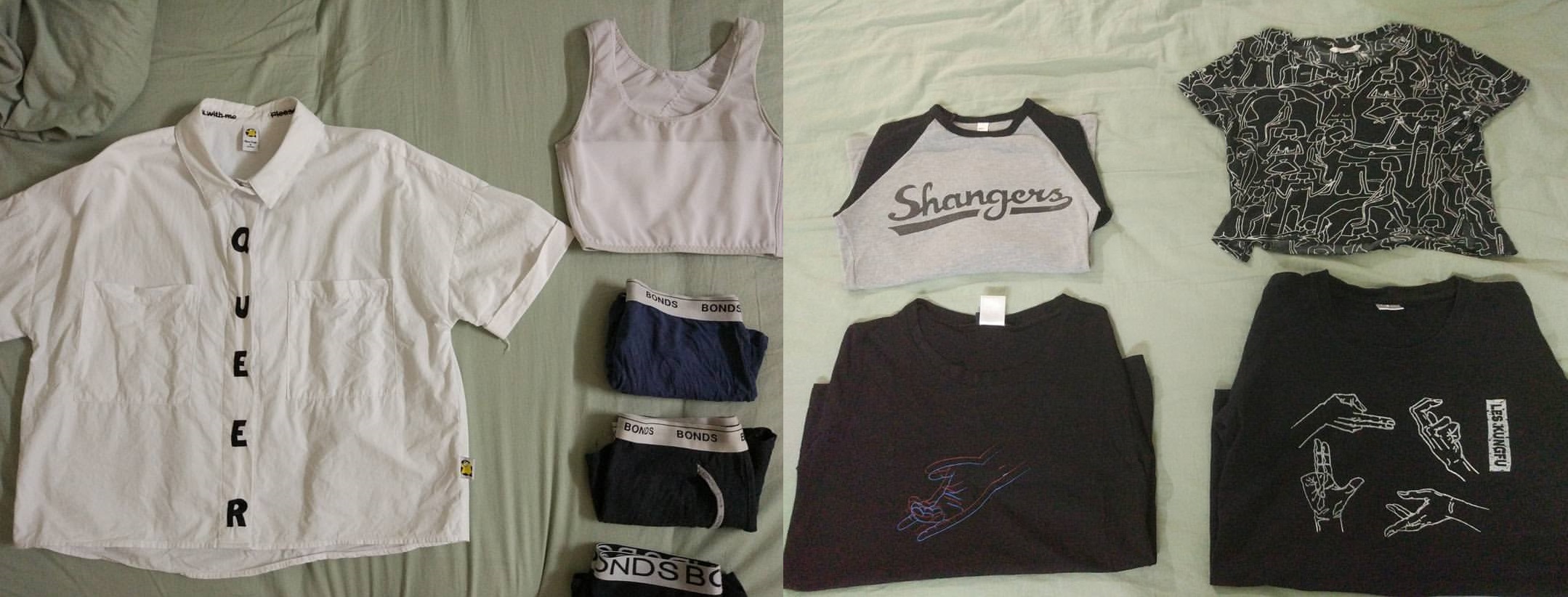
I’d never been to Taiwan but I had a pretty positive image of the country, particularly of its queer communities and activist movements. As a journalist reporting on gender and sexuality in mainland China, I’d often stumble across news and views from Taiwan that impressed me. Taiwan has produced some really astute critical work – as well as my three favorite films involving queer coming of age amid torrid love triangles (Miao Miao, Blue Gate Crossing, and GF*BF if you’re wondering).
So perhaps this quick trip just reinforced my rosy preconceptions but it was really rather sweet. We arrived Friday and headed straight for the sites listed in Autostraddle’s Queer Girl City Guide. I convinced my travel bunny to get an I-Ching reading at the lesbian arcana shop and café salon, Love Boat.
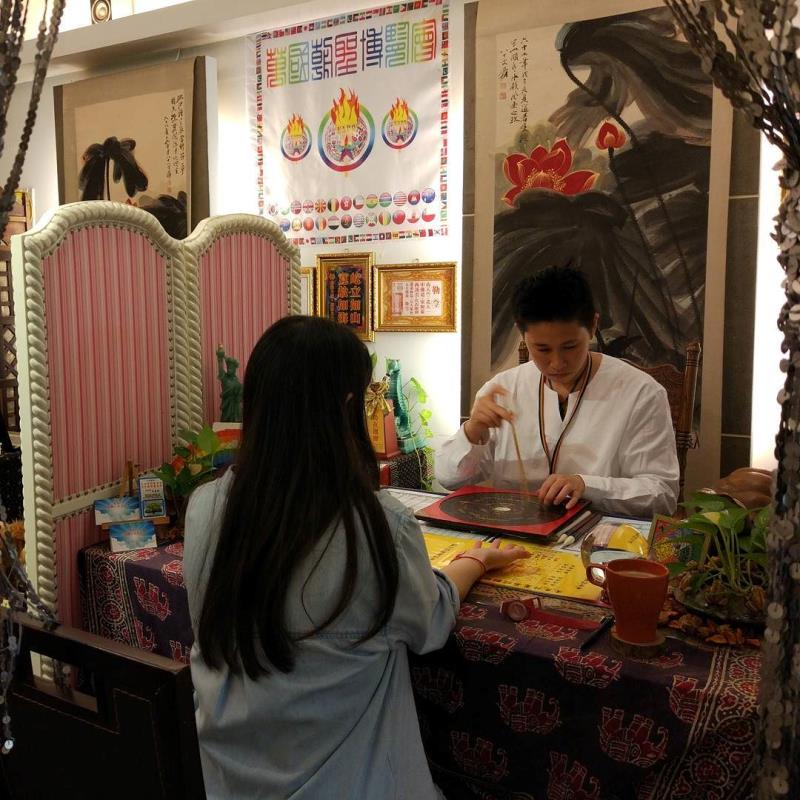
“This is the most lesbian thing you will ever do with your clothes on, Jessica,” I pleaded. She filled in a form then sat down for her divination with the babe who runs the shop. There was some tapping of a stick in a circle? Somehow this never came up in my upbringing but my family is Catholic and atheist Communist so I suppose they wouldn’t approve. Personally I’m fascinated by fortune tellers but fearful, too: I prefer to imagine the future is empty until we make it.
Saturday was the march, which would be the first since the country’s ruling in favour of same-sex marriage in May. Historic! The stream of queers thickened as we approached the starting point, and my heart started to dance. I’m obsessed with hanky code – my friends and I used to have a whole blog about it – so I actually squealed when I spotted an immaculate leatherman flagging red on the right.
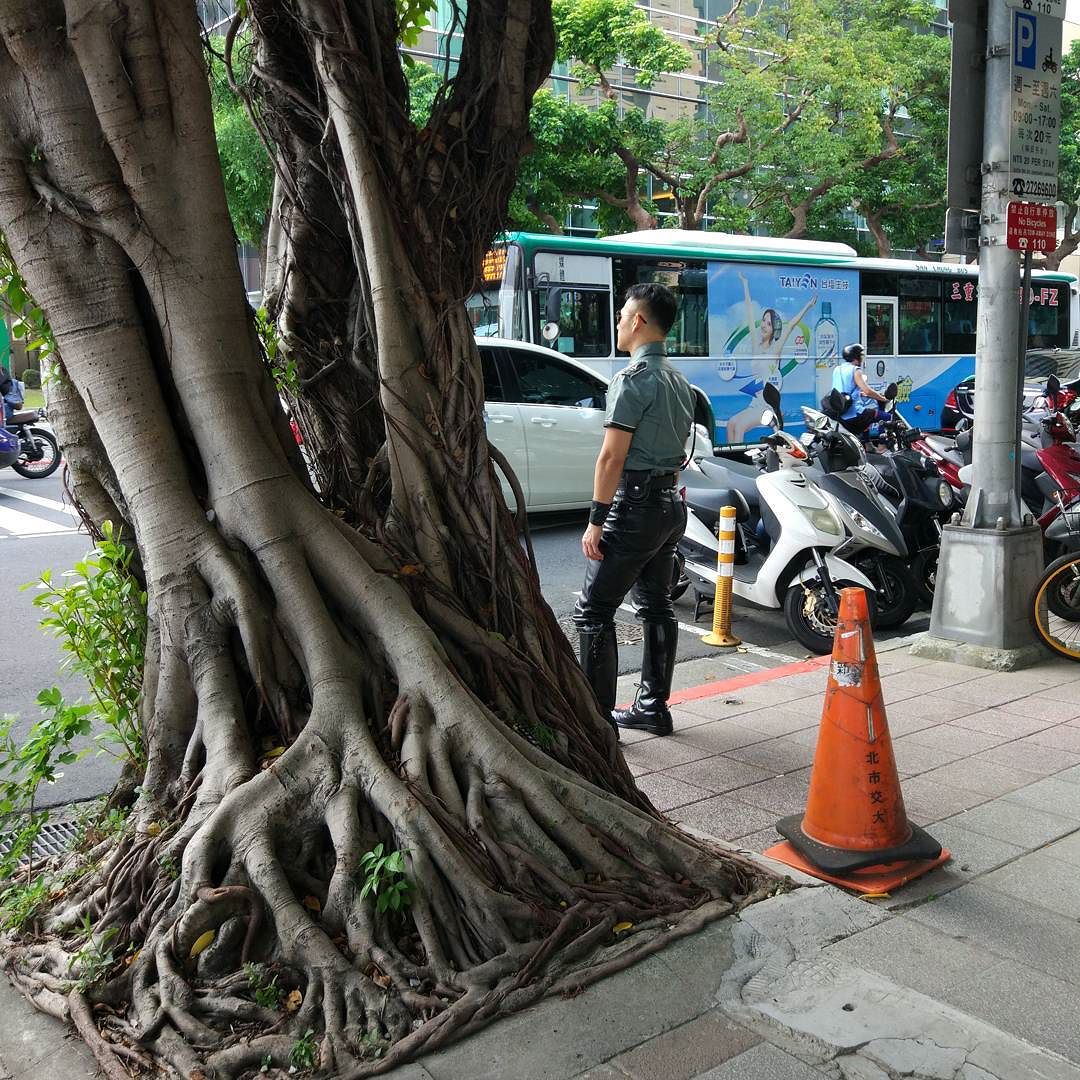
There were lots of flags showing the shape of Taiwan in rainbow stripes. I couldn’t get over the fact that the island looks like an odd butt toy – like maybe you’d gone to sterilize your butt plug on the stove but forgot to add water and it melted a little. Does no one else see this?

The march was to gather around the East Gate of Taipei before breaking into three routes and then reconvening at the end. It took us a while to find our friends in the squish of the crowd. “We’re by the bears,” I kept trying to explain, before realizing that the bears were everywhere. We’d even chanced upon a bear karaoke bar the previous night. In the Chinese parochial imagination, thick guys come from the northeast, but I think Taiwan must be the true bear capital of gaysia.
I’ve been watching a lot of We Bare Bears lately so I would have loved to see three of them stack up like in the cartoon but maybe they save that for the bedroom. We took snaps with some of the furriest and plushest ones with our flag repping Shanghai.
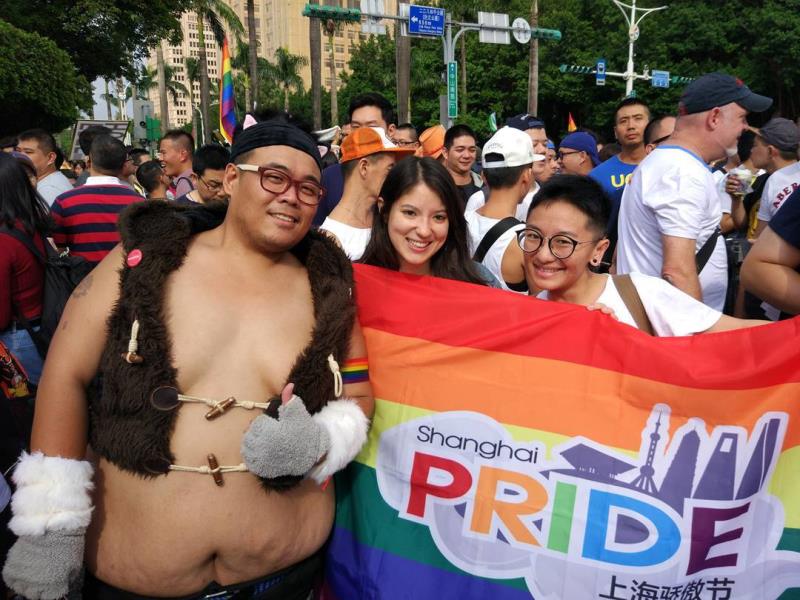
Shanghai Pride has been going since 2009 with a growing roster of events but there’s no march: That kind of public assembly is basically impossible in China’s political system. Being visibly queer is not such a problem but organizing is. On the other hand, Pride March in Melbourne, where I grew up, will turn 23 next year, but as with many bigger processions around the world, you have to register far in advance. One year I got into a confrontation with the guy who’d registered the student network because he said our placards on queer and trans refugee rights were “too political.”
Some marches around the world have turned into parades where corporations and even police forces flaunt rainbows while audiences gawk at the visual spectacle. Everyone is happy and glamorous and ideology gets truncated to telegrammic enthusiasm: Celebrate!
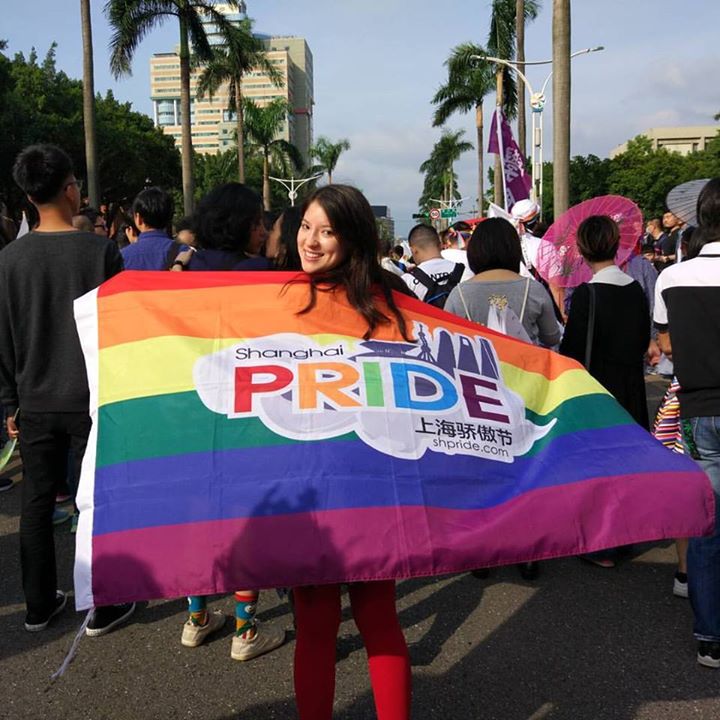
The Taiwan march was refreshing: Highly visible, explicitly political, and community driven. Anyone could just turn up – and there were plenty of unofficial delegations, like us, from all over Asia. We took the green route, which headed north past the ministry of education and part of Taiwan’s parliament. Organizers led chants from a tray truck: “Equal rights in marriage! Diversity in education!” Apart from a few people peddling rainbow gear and a couple of floats sponsored by businesses, the entire event was non-commercial and kind of lo-fi. “This is more like a rally than a parade,” Jessica said.
Once we got to the education ministry, the organizers handed out streamers for us to stick onto the gates. Ours identified us as parents supporting diverse sex and gender education. I was pleased to have suddenly sprouted offspring.
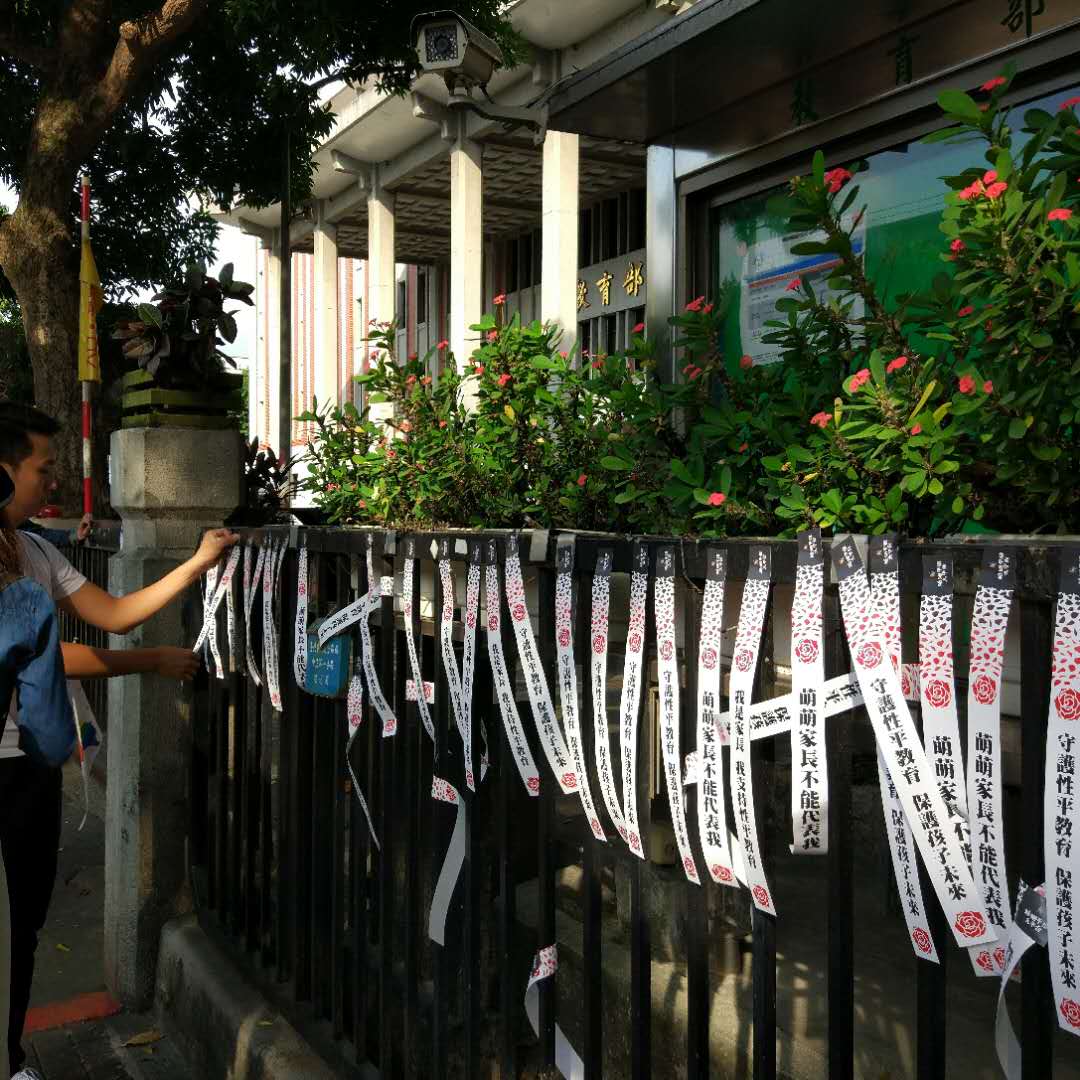
Along the way, organizers explained that the campaign for marriage equality needed to keep the pressure on, as the May ruling set out a two-year timeframe for same-sex marriage to be legalized but didn’t guarantee equal rights compared to male-female marriages. In particular, activists said, some proposed models would only give marriages legal effect in terms of migration and residency if a non-Taiwanese spouse was the national of a country that also recognized same-sex marriage.
“There are so many countries that don’t have same-sex marriage, especially in Asia and Africa,” one woman said over the microphone. “Do they only want us to marry Taiwanese people and Westerners?”
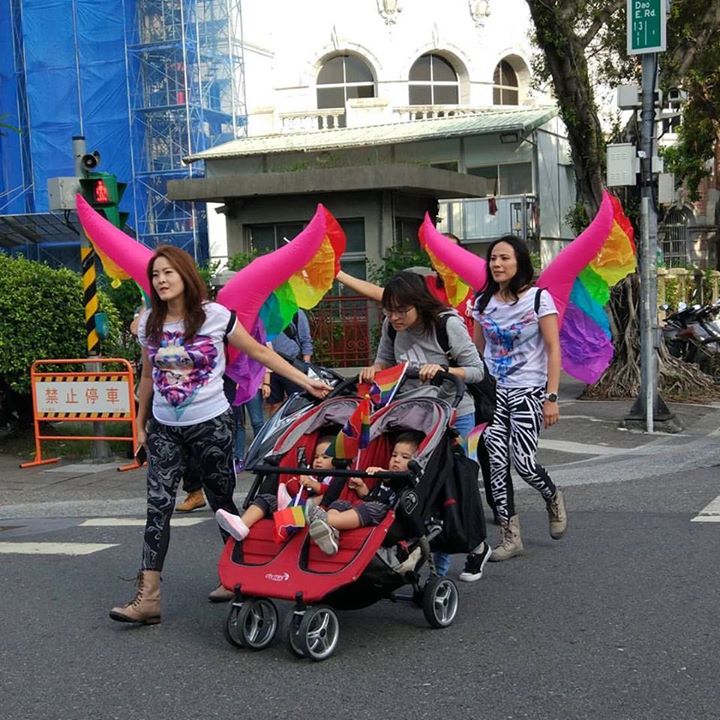
The march finished back at the starting point where a stage had been constructed for speeches and performances. All the speeches had live captions as well as sign interpreters who you could see on a big screen. Two teenagers spoke about their experiences, and a Christian talked about challenging homophobia in the church.
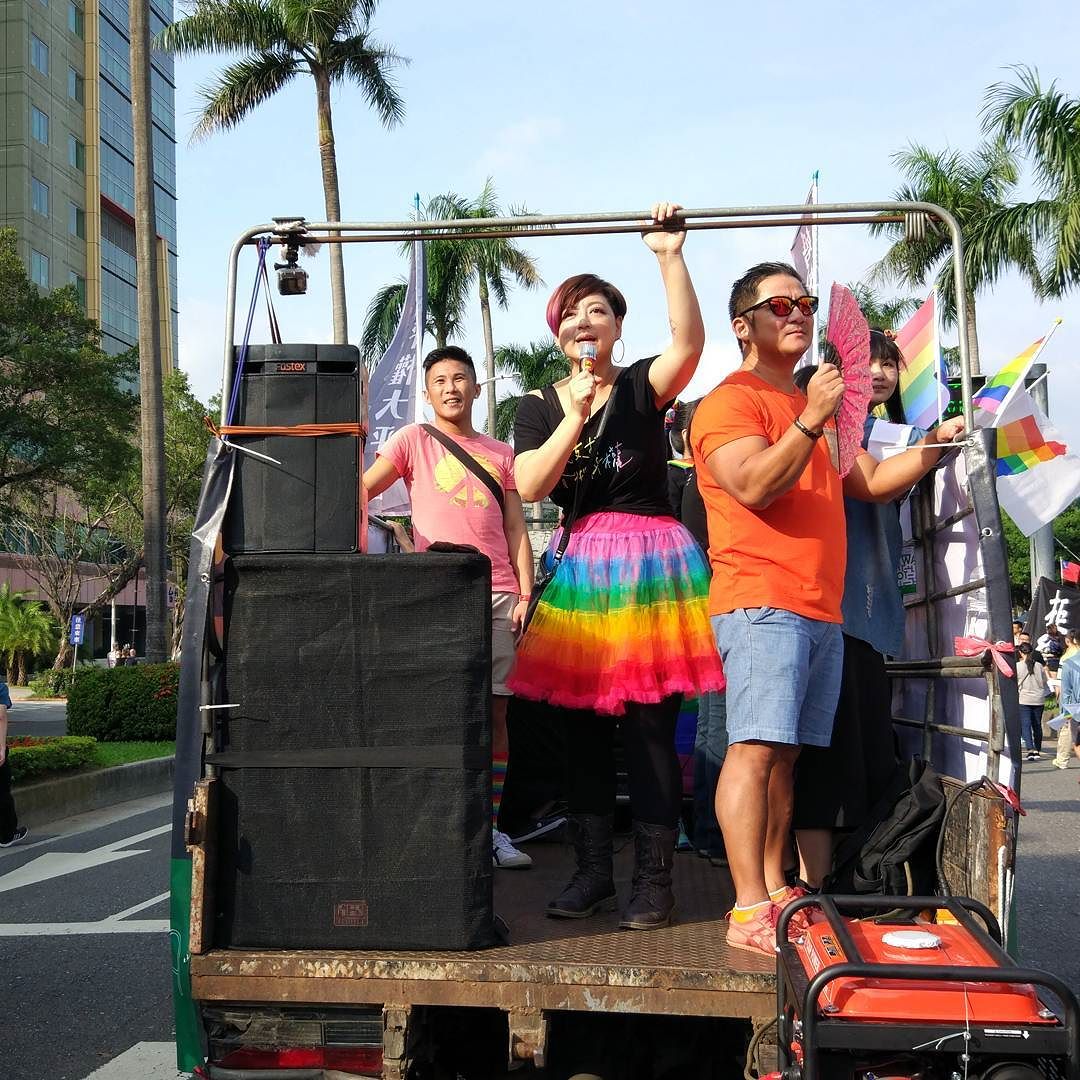
All in all, I got the big gay day in the sun that I’d been thirsting for, and a peek into one of Asia’s most exciting queer communities. It’s not just that Taiwan seems a step ahead in terms of certain civic rights – the May ruling in favor of legalizing same-sex marriage was the first in Asia – but that the whole movement feels a little bit more mature. Years ago when I interviewed a Taiwanese activist for a radio show I produced on queer cultural heritage in Chinese-speaking communities, she told me that we had to move beyond explaining that LGBTIQ people exist.

The mainland Chinese queer community is having some very important, productive, and challenging conversations: When I attended two LGBTIQ conferences last year in Chengdu, the capital of China’s southwestern Sichuan province, presentations covered topics as diverse as asexuality, trans welfare, gay aging, biphobia, and polyamory. But in mainstream spaces, it seems queers get stuck saying “we’re among you, please accept us.” Even in Australia, some gay and lesbian commentators have been gutless in the face of a transphobic backlash against LGBT progress, saying, for example, that marriage equality has nothing to do with bathrooms and sex education.
Seeing 110,000 people take to Taipei’s streets for a pride march that explicitly made diverse sex education its theme gave me hope for a more ambitious movement. Dream big, comrades: The future is empty and we are very, very brave.
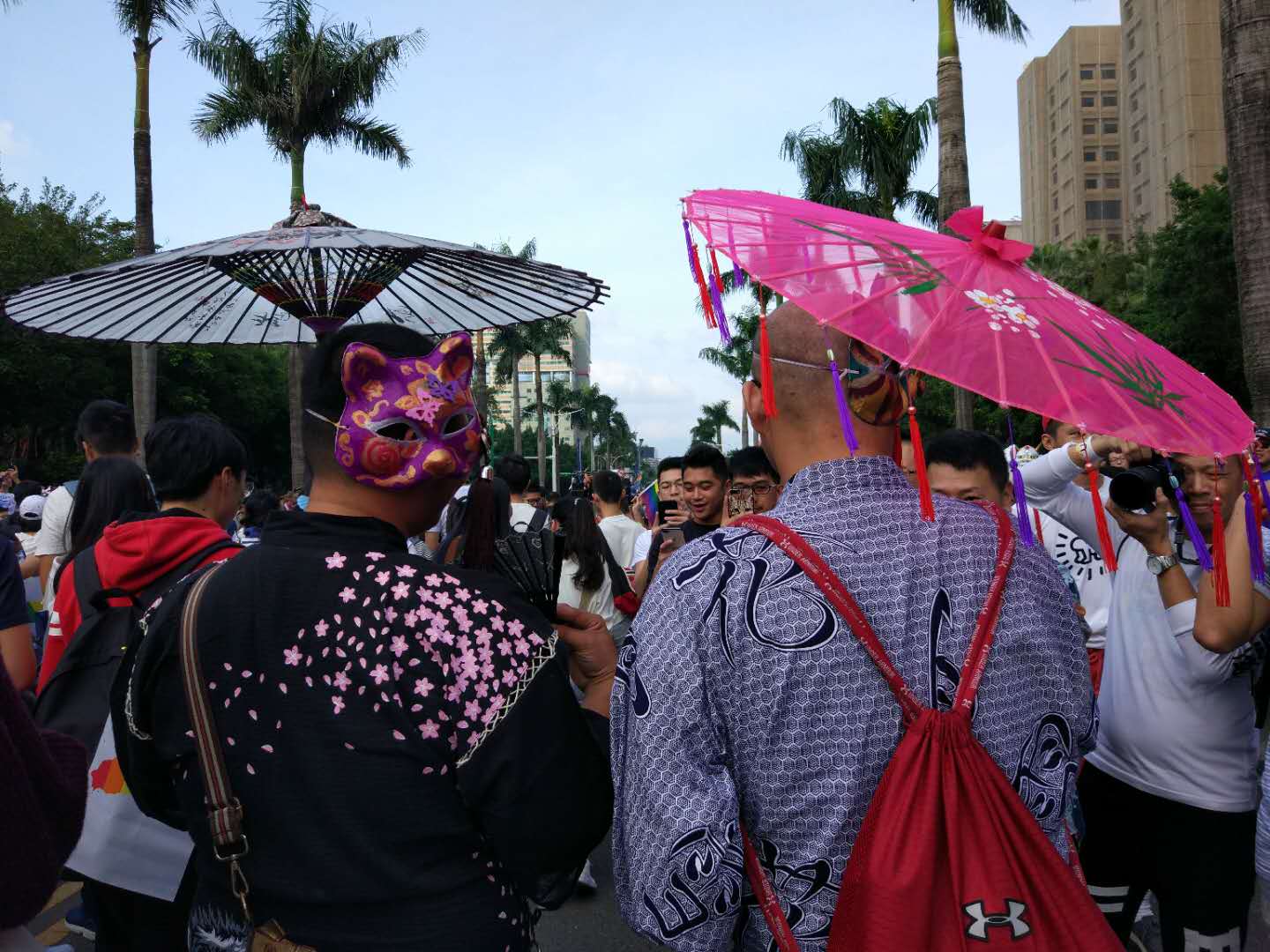
Australia’s Anti-Same Sex Marriage Ads Ranked by Queerness
It’s September 2017 and Australia still doesn’t allow same-sex marriage. Rather than ask politicians to do their damn jobs, self-serving gutless wonder prime minister Malcolm Turnbull has spent $122 million on a postal survey to gauge whether Australians reckon that LGBTQ people are real humans with valid, loving relationships, who deserve the same liberties as everyone else.
The survey asks if the law should change to allow same-sex couples to marry. The “Yes” outcome (predicted) will allow politicians to vote on and pass same-sex marriage legislation. A “No” outcome will result in marriage equality being taken off the table until the next election.
This whole thing is indefensible. It’s a government-approved platform for conservative and religious groups to spew hateful homophobic and transphobic bullshit, which is dangerous and hurtful to queer folks and their families, many who already live their lives in Australia feeling alienated and less than. It’s truly abhorrent.
I’ve personally found comfort in the fact that during this humongous shitshow, the homophobes are staying true to form and making no sense whatsoever, such as creating campaign ads ranging from the absurd to delightfully, confusingly queer. Here they are, ranked.
4. This ad about gay seat belts
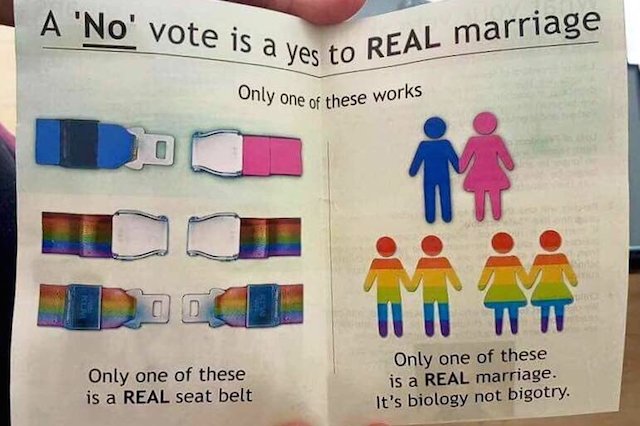
Ah yes, the ol’… seat belt argument against marriage equality. What’s next, are they gonna let square pegs marry round holes!?!?
How queer is it?
Not queer, just dumb as hell. Is this about sex? Is this how straights think we have sex? We’re all just rainbow buckles and buckle ends, fruitlessly clacking against each other in sin.
3. Flashes of light

Just, wow.
How queer is it?
Reading this ad actually made me one bazillion times queerer, how about you.
2. Hm yes very heterosexual

The Coalition for Marriage wants you to know that it’s OK to stand up for what you believe in! Don’t let the PC Police bully you into being a decent and compassionate human being.
How queer is it?
It’s literally the bisexual flag. Hard to say whether the designer is oblivious or we’ve found Australia’s greatest smartarse.
1. Gay Trojan Horse
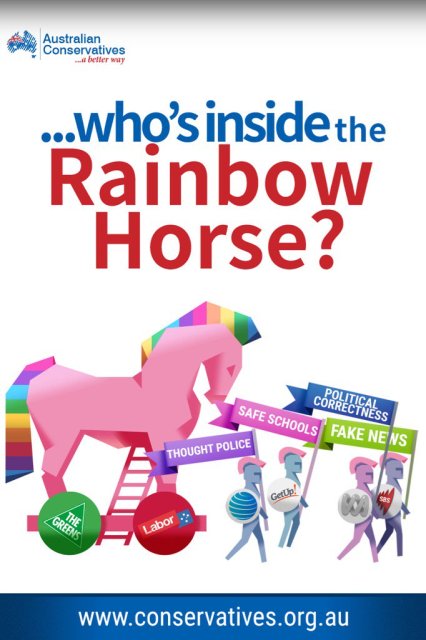
Marriage equality is obviously just a ruse that will open the gates for other awful, terrible things, like… safe schools.
How queer is it?
This is horse is fabulous, I’d definitely get in. I want to see Gay Trojan Horse marching at next year’s Mardi Gras, and turned into an enamel pin for my denim jacket. Also this analogy places us on the winning side, so.
In Their Own Words: LGBTQ Asia Responds to Taiwan’s Same-Sex Marriage Ruling
Taiwan’s decision to legalize same-sex marriage in May 2017 commanded international attention, particularly due to its being one of the first Asian countries to do so. As a queer South Asian person who was born and raised in a very homophobic South East Asian country, I had grown up with the constant rhetoric of “LGBTQ is a Western colonial invention” and still have to contend with comments from the leaders of my country claiming that LGBTQ rights are antithetical to Asian cultural norms, and even fear for my livelihood as fellow LGBTQ activists and community members are oppressed, harmed, or even killed.
Taiwan’s ruling made me curious about how the news was being received by LGBTQ people across Asia. Did they too face cultural and institutional oppression against their gender and sexuality, or were their countries more accepting? Would the ruling have any impact on their livelihoods? Is Taiwan an inspiration for their leaders to consider marriage equality or LGBTQ rights overall, or will it not matter as much?
I made a list of countries in the Asian continent and researched and reached out to at least one LGBTQ activist, organization, or community member in each, including posting on region or country-specific social media groups and direct contact. Out of the countries on my list (excluding the Pacific Islands of Oceania and counting Taiwan, Macau, and Hong Kong as distinct countries), I was able to find at least one contact for 42 of them, and (at the time of writing) received 27 responses from 18 countries, as well as a couple from regional organisations. While there were significant efforts to prioritize female and non-binary interviewees, a considerable number of respondents were male, often owing to the stronger presence of out gay male activists in their local LGBTQ community. Responses came from cis and trans women, cis and trans men, and non-binary people. Some respondents are anonymous or pseudonymous by request.
The responses, while varied and distinct, often carried similar themes. While my respondents were generally supportive and happy about Taiwan’s decision, most did not think that the ruling would be as impactful on their local community as some might guess — citing insularity, lack of media attention, and/or lack of cultural similarity between Taiwan and their home countries. Some respondents felt that the ruling could be used as leverage for their local activism, while others felt that focusing on marriage equality could actually backfire in their efforts to earn the rights of LGBTQ people to exist without fear of persecution or harm. There weren’t necessarily any clear correlations between the legal status of LGBTQ people in their country and the perception of such communities in society: some of the countries with the highest rates of violence against LGBTQ people were countries that decriminalized homosexuality or never had laws against homosexuality in the first place. To be clear, affirmations of a country’s LGBTQ-inclusive legislation in this piece isn’t a referendum on or analysis of the experiences of LGBTQ people as a whole there, or the country’s stance on human rights issues in general. Marriage equality is only one piece of a complex and ever-shifting social and legal reality for LGBTQ people worldwide; to full explore more than that would take much more than one article, and even any discussion of the experiences of LGBTQ people here is necessarily only one portion of a much larger picture.
As one of my respondents, Loretto of Stonewall Japan, warned: “Coming from a Western standpoint we may be tempted to lump Asian countries together, but that would be a mistake.” Even so, it is useful to see how different countries and regions within the continent share concerns and priorities for their local LGBTQ communities and see opportunities for cross-cultural support and understanding.
Central Asia and Eurasia
Most countries in this region, except for Turkmenistan and Uzbekistan, have decriminalized homosexuality; some, such as Armenia, have even signed the 2011 United Nations joint statement on ending acts of violence and related human rights violations based on sexual orientation and gender identity. However, homophobia in the region is still extremely strong, with very little protections for LGBTQ people as well as growing intolerance from the Government and wider society.
The editorial board of the kok.team project, an LGBTQ news and community resource based in Kazakhstan, described some recent government attempts at institutional homophobia: “In 2014 Parliament tried to adopt a discriminative law on protect[ing] children against so-called ‘homosexual propaganda.’ This attempt failed because that year Kazakhstan participated in the competition for the right to hold [the] Winter Olympics. [The] international sports community protested against this law — that’s why our legislators withdrew it.” They also talked about the Members of Parliament of Kazakhstan questioning Kazakhstan Minister of Information Dauren Abayev about the Kazakhstan flag being flown at New York Pride this past June, only to be told that there are no legal measures that can be enacted against the person.
Mamikon Hovsepyan, Executive Director of Pink Armenia, thought it was “interesting” that Armenian media and extremists were “silent on this issue.” “[A] few media outlets wrote about Taiwan but there was no discussion on it,” he explains. While the Armenian Constitution limits marriage to heterosexual couples, the country recognizes all marriages performed abroad, including same-sex marriages. However, attacks against LGBTQ people and community spaces in the country, such as multiple attacks by Neo-Nazis on the lesbian-owned bar DIY Rock Club in 2012, have stirred up heated debates on “LGBTQ rights vs national interests.”
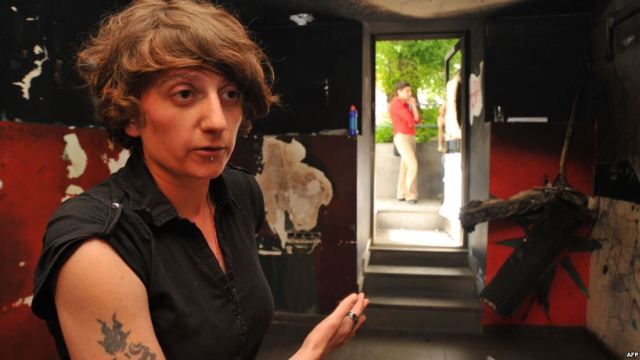
Armine Oganezova, the owner of DIY, an alternative music bar in Yerevan, stands inside what is left of her club after a fire-bomb attack in May 2012. From RadioFreeEurope.
Attempts at same-sex marriage in Armenia and Kazakhstan in the past decade have garnered controversy and awareness about the plight of the local LGBTQ community. In 2006, Harutyun Zhonzhikian, the founder of the Armenian Gay and Lesbian Organization (AGLA), married Misha Meroujan (whom he met through AGLA), both making the trek down from Paris to marry at the Armenian Apostolic Church in Echmiadzin to reflect their still-strong connections to Armenian culture. In 2013 LGBTQ rights activist Vladimir Kornakovsky made headlines by organizing a lesbian wedding in Karaganda, a city in north-eastern Kazakhstan, between Kristina Chernysheva and her partner Karolina. Heartbreakingly, a year later, Chernysheva was found brutally murdered; Karolina has been detained as a suspect.
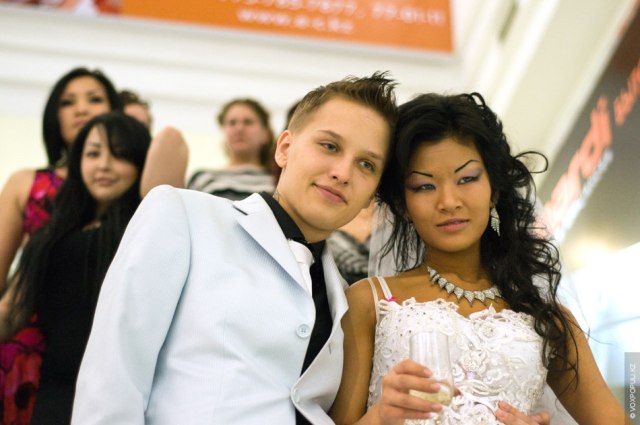
Kristina and Karolina’s wedding in Kazakhstan by Vox Populi
Russia was cited by all respondents as a major influence on the social-political factors affecting their local LGBTQ communities. These countries were formerly part of the Soviet Union and still hold a significant number of Russian migrants.
“For now I think we are not relevant to comment on it [since] Armenia is under the pressure of Russia these years,” said Hovsepyan. “We are too far from equal marriage recognition but let’s keep in touch and probably there will be some development in the nearest future.”
“Kazakh nationalists say it is the Russian influence — Russian colonists brought ‘homosexualism’ [to the] Kazakh steppes in [the] 18th century and before this we had no ‘homosexualists’,” says the kok.team, though a representative of Tajikistan-based organization Equal Opportunities cites Russian influence for the country’s homophobia. “Unfortunately, due to the influence of Russia on the economic, social and political life in the country, the situation of LGBTQ people is not entirely in a good position.” In 2011 Equal Opportunities collaborated on a report on crimes and structural oppression against LGBTQ people in Central Asia with Kyrgyzstan-based organization Labrys and the Sexual Rights Initiative , an international coalition focused on advancing human sexuality rights in the United Nations.
As a result, some in the region don’t even really see themselves as Asian. “We do not have any contacts and ties with the countries of Asia (even there are no flights, connections at different levels, a language barrier, religion, etc),” says Equal Opportunities. “Therefore it is difficult to say, it is possible to affirm that the changes in [other] Asia’s countries cannot affect us in Tajikistan.”
That being said, they still see opportunities for collaboration with others in the continent. “The countries of Asia can share their experience on the development and mobilization of the community, developing health programs, advocacy companies and other activities which can help to unite LGBTQ people here. How to work with governmental organizations, with journalists, etc.” Indeed, kok.team’s earlier recounting of international pressure making a difference on the Government’s attempts to institutionalize homophobia demonstrate the potential power of cross-border cooperation in making a difference for local LGBTQ rights.
Western Asia / Middle East
Coverage of the (truly) horrendous treatment of LGBTQ people in countries such as Saudi Arabia and Iran tend to build assumptions that the entirety of the region is heavily homophobic, especially due to Islam being the State religion for most of the region. However, laws related to LGBTQ people differ across the board — ranging from highly oppressive regimes to relatively open laws for queer and/or trans people.
Most notable in the region for their laws protecting LGBTQ people is Israel, which does have anti-discrimination laws and does recognize same-sex cohabitation. While Israel does not have civil marriage for couples of any gender, they do recognize marriages held abroad, including same-sex marriages. However, much like in some of the Central Asian states, some in Israel do not really consider itself as part of Asia or Asian culture.
“From my point of view as someone who knows well the political condition in my country, Israel is more positioned as European than Asian, with no relation to the geographical map. The country[‘s] goals are to position Israel as part of the free world,” says Chen Arieli, Chairperson of Israeli National LGBTQ Taskforce The Aguda, who also discusses Israel’s political system highlighting their progressive LGBTQ laws regularly in international media coverage. “It is, of course, complicated with our main Arab-Israeli conflict and the occupation, but the close relationship with the United States and to Europe [has] established Israel much more as a main Western world than anything else.” (A Palestinian LGBTQ organization has been contacted for comment but has yet to respond as of the time this article is written.)
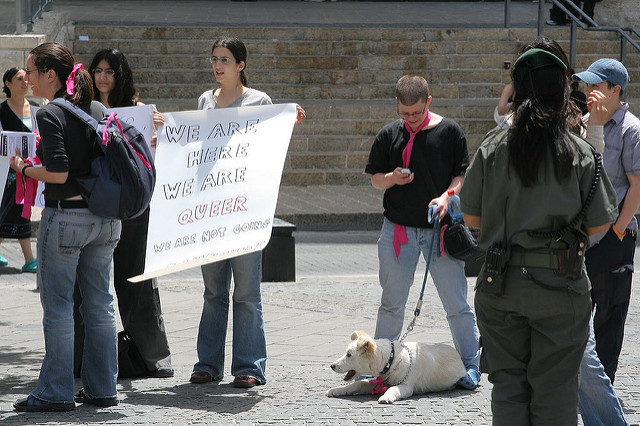
Gay demonstration in Zion Square by Brian Negin
In the rest of the Middle East, some are hopeful about Taiwan’s ruling. “Taiwan’s ruling in our favor is a huge step in the right direction and we can only dream of such a reality in the Arab world, even though we know there will always be obstacles from our wider community,” says an anonymous queer woman based in Bahrain. While Bahrain decriminalized homosexuality in 1976, LGBTQ Bahranians are still subject to immense demonisation and state-sponsored violence. “An Asian country embracing same-sex marriage gives us a great deal of hope and much needed encouragement to continue the struggle for our basic rights, not just to exist without persecution but to also marry and build families with our loved ones, instead of hiding in fear.”
Others are less optimistic. “I don’t think the ruling in Taiwan will have a tangible effect on the Middle East. I think we have a long way to go […] Changes need to be from the inside,” says Dana, a trans woman based in Jordan. Homosexuality has been decriminalized in Jordan since 1951 and gender transition was made legal in 2014.
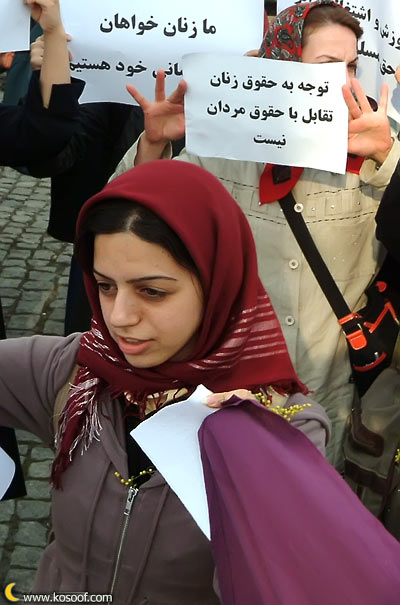
Zeinab Peyghambarzadeh by Arash Ashoorinia
Iranian gender and sexuality rights activist and academic Zeinab Peyghambarzadeh, who has written about bisexual erasure in the Iranian LGBTQ rights movement and who was arrested in 2007 during a protest in support of women’s rights activists on trial, brings up institutionalized homophobia as a core part of their country’s media and political landscape. “I do not have any hope that the formal law and regulations in Iran regarding LGBT rights and even women’s rights can change soon because they are an important aspect of the official ideology of the Government especially in defining this ideology in contrast with the Western modern human rights discourse. However, the Government may stop [the] execution of some discriminatory law for a while, due to internal or international political reasons.” While homosexuality carries the death penalty in Iran, gender transition is legally recognized if accompanied by medical intervention.
Jordanian Queer Muslima, a liberation theology research scholar focusing on gender, racial, and sexual liberation within Islam, questions same-sex marriage as a priority in LGBTQ liberation, even as she is happy for those celebrating the right to marry. “In my opinion, sexual liberation cannot be detangled from racial, colonialist, classist, ableist, gendered, religious liberation. I believe a focus on rulings such as these pinkwashes a movement that seeks holistic liberation in these intersecting fields of oppression.” Citing the various structural oppressions faced by LGBTQ people such as hunger, homelessness, and misogynoir, she asks: “Who decided that equal marriage was the direst demand? Did this decision come from all peoples of the community or just those privileged few? If we truly seek communal liberation, then it is imperative to speak directly to the community — not over it.”
Peyghambarzadeh discusses the priorities of Iran’s LGBTQ community: “Of course, Iran’s LGBT communities are very diverse with different priorities, but in my opinion, decriminalization of same sex sexual conduct and stopping the hate speech against LGBT community can be a priority for different groups because they play a key role in reproducing the LGBTphobic culture.”
“Today Islamic scholars, jurists, leaders, and members of communities are working in many ways to legally, academically, and socially carve a space for LGBTQIA+ peoples. We speak against the dominant discourse that says ‘Islam is heterosexual’ through work in grassroots organizations, social organizing, academia, public protest and living.”
While many may be tempted to cite Islam as the main reason for the Middle East’s institutionalized homophobia, Jordanian Queer Muslima pushes hard against this argument. She argues that before Victorian-era colonization, “Islamic discourse spoke to communities that were gendered and sexually fluid,” citing examples of Caliphates with openly gay children, poems written about bisexual men by female writers, and Islamic jurisprudence handling issues related to their queer children. “Today Islamic scholars, jurists, leaders, and members of communities are working in many ways to legally, academically, and socially carve a space for LGBTQIA+ peoples. We speak against the dominant discourse that says ‘Islam is heterosexual’ through work in grassroots organizations, social organizing, academia, public protest and living.”
Could international solidarity help LGBTQ communities in the Middle East? Peyghambarzadeh seems to think so. “Iranians have more cultural exchanges with majority Muslim countries especially the Middle Eastern ones, and their LGBT friendly media products can reduce LGBTQphobia amongst Iranians.” Jordanian Queer Muslima, however, is more cautious. “Direct and open solidarity now may be counterproductive. Openly LGBTQIA+ people are targeted by community and state alike, but simultaneously our country is homoerotic from some buried identity that has persisted since physical presence of the colonialists.” She brings up Jordanians’ affectionate gestures, such as holding hands and kissing cheeks, which are common between straight-identifying men and women that are “very very comfortable with the same sex but will never allow space for openly homosexual peoples.”
Acknowledging the work of Jordanian LGBTQ people in securing their rights, Jordanian Queer Muslima states: “What we need is the international community to support us in whichever way we deem fit. We know our immediate needs and it might now necessarily be marriage equality and that’s OK.” However, she thinks that solidarity and cooperation should be virtual, never physical, out of concerns for dangers and safety. For her, being able to find community through Tumblr helped her find her community, sparked her interest in Islamic liberatory theologies, and helped her understand that she wasn’t alone. However, she also notes that for others, the needs might be greater: “The realities of a refugee woman, a street child and a Bedouin village girl can never be the same and will not have the same needs.”
Next: South Asia and Southeast Asia
The Conservatives’ DUP Deal Illustrates Their Consistently Cynical Support for LGBTQ Rights
feature image via LGBT Conservatives
With the days of being able to openly brag about having once owned half the world thankfully behind us (a fact somebody should point out to Boris Johnson), the UK has been looking for a new identity. We’ve tried Cool Britannia, we’ve tried The People Who Make Downton Abbey, but over the last couple of years we seem to have settled on Messy Bitch Who Loves Drama. Last year, the Tories held a cynical power grab of a vote they never expected to lose, only to have it completely blow up in their face and leave the country in chaos. Less than a year later, they’ve done the exact same thing again. My cat is better at learning from her mistakes, and she eats plastic for fun.
Theresa May called this snap election with the aim of completely wiping out Labour and achieving the kind of majority that would allow her to do whatever the hell she liked for the next five years. Instead, Corbyn increased Labour’s share of the vote by a higher percentage than any leader since 1945, the Tories lost their majority in Parliament and even the newspapers that were hailing her as Thatcher reborn the day of the election are calling for her resignation. However scared you might be about the future, it’s worth taking a minute to just appreciate that. She completely fucked it, you guys. Just look at her face!
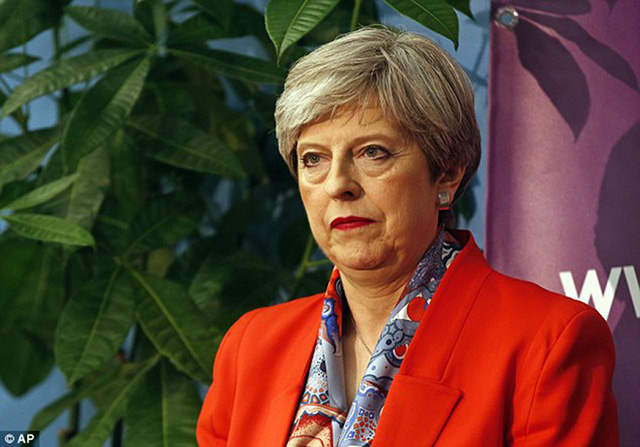
photo via the daily mail
No majority means a hung parliament and a hung parliament means it’s time for another coalition, baby. Yes, we’re on our way back to 2010! Time for everyone to argue about the series finale of Lost, think WikiLeaks is great and still be excited about Marvel movies! Except this time, the Liberal Democrats came right out the gate and said they weren’t open to teaming up again. Probably for the best. So, what’s a minority government to do? Their most obvious allies, UKIP, lost their only MP in the election (and you might want to take another minute to appreciate that). Time to look a little further afield. Like… across the Irish Sea, perhaps?
Most of the time, the mainland’s attitude towards Northern Irish politics is basically
 One of the biggest stories in UK politics over the last year should have been the Northern Irish green energy scandal that cost taxpayers almost £500 million, almost lead to the First Minister being removed from office and caused the collapse of the country’s power sharing agreement. Last week’s election wasn’t even the first snap election in the UK this year! But you’d be forgiven for not knowing that, given that it had basically zero coverage outside of Northern Ireland. Once in a blue moon, however, it becomes politically expedient for the English political elite to remember Northern Ireland exists. Enter the Democratic Unionist Party!
One of the biggest stories in UK politics over the last year should have been the Northern Irish green energy scandal that cost taxpayers almost £500 million, almost lead to the First Minister being removed from office and caused the collapse of the country’s power sharing agreement. Last week’s election wasn’t even the first snap election in the UK this year! But you’d be forgiven for not knowing that, given that it had basically zero coverage outside of Northern Ireland. Once in a blue moon, however, it becomes politically expedient for the English political elite to remember Northern Ireland exists. Enter the Democratic Unionist Party!
Sure, they were the party that oversaw the failed renewable energy scheme. And, sure, the British government being seen to favour one political party in Northern Ireland would further inflame a crisis that has the potential to bring down the entire peace process. But with ten MPs following the election, if the Tories could rely on the DUP’s votes, they’d have a majority (of one, but a majority nonetheless). While the Tories have gone back and forth over whether they’ve reached an agreement over the weekend, their desperate situation — entirely of their own creation! — means they’re going to be reliant on the DUP somehow.
There’s just one problem: they’re complete crackpots. Founded by a fundamentalist evangelical minister and hardline unionist, the party has links to paramilitary groups and campaigned against every attempt to end the Troubles, including the Good Friday agreement. They’re the epitome of old-school far-right conservatism; Northern Irish feminists have spent years trying to raise attention to how atrocious they are, without much luck. While the rest of the UK has turned a blind eye, the DUP has vetoed extending marriage equality to Northern Ireland five times, maintained an almost complete ban on abortion and counts a number of young-earth creationists and climate change deniers among its senior members. DUP-controlled councils used to lock up playgrounds on a Sunday so kids couldn’t have fun on the sabbath. No, seriously.
The idea of the DUP gaining influence in Britain has caused, shall we say, some alarm — even among the Conservatives themselves. Since the early noughties, the Tories have been working overtime to try and rid themselves of their traditional reputation as the Nasty Party. Despite having spent the preceding few decades whipping up homophobic panic to attack the opposition with, they soon identified support for LGBTQ rights as a way to attract socially liberal voters. During the 2010 campaign, David Cameron said that under his leadership, the Tories could “…look gay people in the eye and say, ‘You can now back us… because we now support gay equality'”, despite the fact that less than a decade had passed since he voted against the repeal of section 28, against lesbian couples having the right to IVF and against gay adoption. It was a cynical ploy to rewrite history, but it’s worked; Pink News even named David Cameron ally of the year in 2016 in recognition of his contribution to the introduction of marriage equality in England and Wales. Getting into bed with the rabidly homophobic DUP blows open the entire facade that the Tories ever genuinely cared about LGBTQ rights.
As a result, eyes have turned to the leader of the Scottish Conservatives, Ruth Davidson (no relation. I don’t think). The Tories have long been a joke in Scotland; for a good few years, Scotland was home to more pandas than Conservative MPs. The party was unable to shake the association with Thatcher’s disastrous introduction of the poll tax in Scotland before England and Wales, popular opinion frequently runs more left-wing in Scotland than the rest of the UK; and the Scottish parliament is dominated by the centre-left Scottish Nationalist Party. After over a decade of failing to get more than a single MP elected, in 2011 the Scottish Tories elected Davidson as their leader.
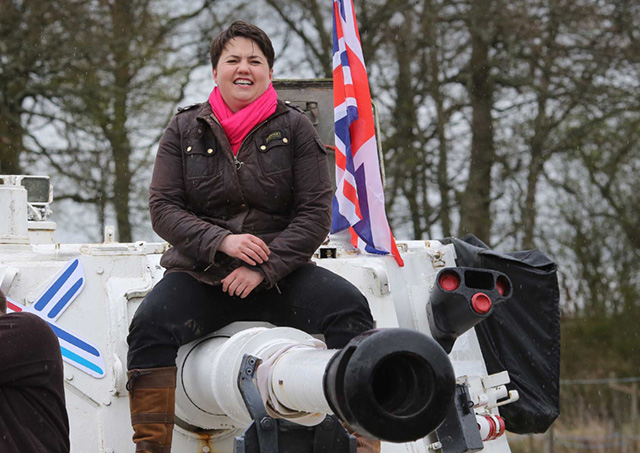
photo credit via Scotsman
Davidson epitomises the shift towards a cuddlier, softer kind of Tory you could take home to your mum. Her party may support xenophobic, unsustainable cuts to immigration levels, but she also gives speeches about how immigrants should feel welcome in the UK. She might have refused to denounce the inhumane rape clause — a welfare change that limits tax credits to the first two children in a family unless the mother can provide evidence the third child was conceived non-consensually — but she was vocally against Brexit. She takes silly photos of herself straddling tanks. She’s also, significantly, an out lesbian. She’s still loathed among most of the queer community, but her rebrand of the Scottish Tories has been incredibly effective among the general population.
The Scottish Tories are now the second largest party in Scotland and the official opposition in the Scottish Parliament. They have 13 MPs in Westminster after gaining 12 seats in last week’s election, more than they’ve had since 1987. Where May has suddenly found herself a fragile and deeply disliked leader of a flailing party, Davidson is the popular architect of an unlikely success story. Rumours are circling she may even split the Scottish Tories from the main party following the disastrous election results in England and Wales.
Soon after news of the DUP alliance came out, Davidson tweeted a link to a speech she gave at 2016’s Belfast Pride, implicitly criticising the deal. On Friday evening, Davidson told the BBC that she had ”received assurances” from the Prime Minister that existing LGBTQ rights in Great Britain will be safe, and that Theresa May would try to use her influence to advance LGBTQ rights in Northern Ireland. At the same time, however, a senior Conservative MP was raising the possibility that abortion time limits could be lowered in Great Britain as part of the party’s discussions with the DUP.
In Davidson’s statement to the BBC, she said that LGBTI rights were more important to her than her party. It seems, however, that women’s rights aren’t quite as important. Davidson’s so-called progressive values — the values that have fuelled so much of her and her party’s success — extend exactly as far as they benefit herself. Ruth Davidson, the Scottish Tories, the main Tory party — in the end, LGBTQ rights have only ever mattered to them as long as they can get something out of it.
The Tories have spent over a decade using our community to score votes while ignoring and exacerbating the issues we really face. Their pact with the DUP has shown that they’re more than happy to throw us under the bus if it helps them cling onto power. Even Ruth Davidson’s attack on the DUP, which is already being spun as a courageous stand for LGBTQ rights, just shows how craven the queer Tories we’re expected to cheer for are. They’ll happily stand aside while our fundamental rights are dismantled — as long as it doesn’t affect them. Remember that when you see the LGBTory banners at Pride this year.
UK Government Giving Money from Taxes on Tampons to an Anti-Choice Charity, Because Of Course They Are
If it weren’t bad enough that tampons and pads are taxed as non essential items, unlike, say chocolate tea cakes, we’re now using £250,000 of those taxes to fund the anti-abortion charity Life.
This seems completely absurd, but there is an explanation, albeit an entirely unsatisfactory one. The UK government can’t take the tax off tampons until the EU gives us permission to do so (supposedly later this year) or until after we’ve finished Brexiting away from them. So we’ll see what happens then. In the meantime the government responded to requests to remove the tax by earmarking the money raised by it for funding various organisations that provide services to disadvantaged women. So far, so good. There’s something of an irony that this tax on uterus owners is being used to solve problems inflicted on them by mostly cis men, as the fund has an emphasis on domestic violence groups, but at least the money is being spent back on us.
Somehow though, in amongst the perfectly reasonable organisations like Refuge, the government decided to funnel a not-insignificant sum to Life, an anti-abortion campaign group. To be fair to Life it doesn’t just restrict itself to giving unhelpful and emotionally manipulative phone counselling to pregnant people, or proselytizing to 15year-olds. They also offer help to pregnant people in need of housing and other social services.This is, presumably, the justification for handing them a large sum of cash from a fund intended to help women.
It’s still completely unacceptable.
Even if Life’s share of the tax money is restricted so that they can only use it for social services, by funding that side of their work the government allows them to reallocate existing funds to their anti-abortion campaigning. It also helping Life to survive and thrive as a service provider in a funding-cuts-heavy environment when other agencies who also provide those services without an anti-choice agenda are in desperate need of money. If those agencies then close or simply can’t meet the demand people are going to be forced to turn to Life when they otherwise wouldn’t have, likely leaving them feeling pressured to carry to term. Gratitude and obligation, not to mention physical need, are very powerful forces meted against vulnerable persons.
Then there’s that by funding Life the government is giving them their tacit approval, something they’ve already done once before by inviting them to take part in a government sexual health panel. Life’s policy is, unsurprisingly, abstinence only — something which not only doesn’t work but has been proven to deliver worse outcomes, making their inclusion questionable at best. When combined with the exclusion of veteran abortion provider and sexual health service BPAS it becomes a troubling statement about what the government prioritises when it comes to sex, health and bodily autonomy. This is particularly worrying right now as we have just managed to bring forward a bill decriminalising abortion for the first time since the Victorian period (for more about how abortion isn’t technically legal in the UK and our labyrinthine and inappropriate abortion laws see my previous article). The government needs to know that we support increasing abortion rights, not suppressing them, and that it is absolutely unacceptable to force uterus owners to fund an organisation trying to restrict our bodily autonomy.
So how do we start? This link provides a guide to contacting your MP on social media and by email. Demand an explanation of why they’re funding this charity until they give one and then let them know what you think of their answer. While you’re at it remind them that we want abortion fully decriminalised.
Considering that AFAB children are currently actually missing school because they can’t afford to buy sanitary products you might want to suggest they redirect some of the money there instead. Or to a rape crisis centre in Scotland, as none of them received any of tampon tax funding either. Make as much of a fuss as possible on social media, too, because nothing is as effective as embarrassment and bad PR to motivate a politician. The twitter hashtags #tampon and #TamponTax are a good place to start.
BPAs is requesting an explanation as to why Life received this funding here.
There’s a petition to make sanitary products available free in schools here.
Blame Conservatives and Their Austerity Measures for Why LGBTQ Healthcare Sucks in the UK
Feature image via independent
It’s 2013, and I’m about to receive my first ever smear test. I’m talking with the nurse before the whole “cold things going in intimate places” business starts. She asks about my sexual history, and I tell her what I’ve carefully rehearsed: I’ve never had sexual intercourse involving a penis. She looks confused for a minute, then leaves the room. She brings someone else in, and they ask the same question. When I give the same reply, they talk for a minute or two like I’m not there. Then they both leave. I wait until I get bored enough to pull my phone out, then wait some more. The nurse returns. She doesn’t think I need a test, but they’ll do me anyway, since I’m here. And she’ll use the small speculum, so I’m more comfortable. “Oh, there’s no need for that! I’ll be absolutely fine with the large ones,” I laugh. She realises what I’ve implied at the same time I do. The awkward silence lasts a long time.
Uncomfortable encounters like mine are hardly unfamiliar to those of us who don’t fit the standard model of cishet womanhood that healthcare providers are used to treating. At least in the UK, we’re generally not paying to be uncomfortable, as the National Health Service (NHS) has provided healthcare free of charge to all UK residents since 1948.
However, things are changing are changing for the NHS. The Conservatives have been in power for seven years now, and the brutal austerity measures they’ve pushed through while in office have included funding cuts and restructuring that have left the NHS “at breaking point”. Staff are striking, non-citizens are increasingly being stripped of their right to free and equal treatment and services are being axed around the country. As a group reliant on specialist training and services, the LGBTQ community is among those that are especially bearing the brunt of this crisis. And as is so often the case, it’s queer women, both cis and trans, and non-binary folk that are suffering the most.
The National LGB&T Partnership recently held the first annual National Lesbian and Bisexual Women’s Health Week, intended to raise awareness about health inequalities for lesbian, bisexual and other women who have sex with women. The statistics they released over the week are unlikely to be a surprise for most of us: queer woman, and bisexual women in particular, are more likely than heterosexual women to experience long-term mental health issues, to have taken drugs, to drink at a rate damaging to their health and to smoke regularly. Women who identified as lesbian or bisexual were also more likely than both heterosexual women and gay and bisexual men to have experienced discrimination in the health sector, with 50% reporting negative experiences in both Stonewall’s research in 2008 and the National LGB&T Partnership’s own survey last year. Despite it being unlawful to discriminate against patients on the grounds of sexual orientation since 2007, a number of respondents to the LGB&T Partnership’s survey reported being given incorrect information or poor treatment due to their sexuality as recently as the last six months.
For both cis queer women and many DFAB (designated female at birth) non-binary folk, smear tests (aka cervical screening or cervical cancer checks) are a particular source of frustration with the NHS. While every owner of a cervix is susceptible to cervical cancer and thus entitled to a free, regular test for abnormalities, a lot of healthcare professionals are wrongly convinced that those who don’t engage in penis-in-vagina intercourse don’t need to be screened. My own awkward experience was just the tip of the iceberg, with many ending up being refused a test or even taken off the register of those eligible entirely in spite of the General Medical Council (the organisation that regulates doctors in the UK) classing such refusal of treatment as direct and illegal discrimination. As a result, over half of cis lesbian and bisexual women of eligible age have either never had a smear test, or not had one within the recommended time frame of every 3 or 5 years.
For the most part, poor treatment of of LGBTQ patients in the NHS comes down to a lack of knowledge among healthcare practitioners. In 2015, Stonewall found that only one in four patient-facing staff had received training on LGBT health needs and inclusive practices, with trans-specific issues often remaining unaddressed. As a result, 10% of health and social care practitioners in the UK weren’t confident in their ability to understand and meet the needs of LGB service users; this jumped to 24% when it came to trans service users. Understanding of non-binary identities is particularly lacking; as one friend told me: “Most people don’t even know we exist, and even the computers sometimes struggle to deal with us. I’ve actually only found one NHS employee who was written my full referral with correct pronouns, and has consistently been 100% respectful about it”. While they were pleased that “there are more people in the NHS who are learning and understanding about previously invisible identities”, NHS training budgets have been repeatedly cut over the last ten years, standing in the way of attempts to spread knowledge to those who need it the most.
Healthcare professionals’ status as gatekeepers to treatment makes this lack of understanding particularly damaging when it comes to trans healthcare. Hormone therapy, gender confirmation surgery and laser hair removal treatment are all available for free on the NHS, but accessing them typically requires a diagnosis of gender dysphoria and referral to one of the UK’s 14 gender identity clinics, where waiting lists are frequently months or even years long due to lack of funding. A referral and treatment can be denied at the clinician’s discretion, with non-binary trans people and those with disabilities and/or mental health issues (it’s common for GPs to refuse to offer a referral to anyone who’s undergoing treatment for depression, for instance) at particular risk of being denied transition related healthcare. Many end up resorting to private treatment, if they can afford it, or self-medicating.
It’s not all bad, particularly in comparison to the current situation in the US. Even among the right wing, the right to universal free healthcare (for British citizens, at least) is largely considered sacred – a 2013 poll found that 72 percent of people believed the NHS to be “a symbol of what is great about Britain and [that] we must do everything we can to maintain it”. In theory, every LGBTQ person in the UK is entitled to have that healthcare respect them and their identity, and there are many practitioners in the NHS who work to ensure that’s the case. However, that work is becoming harder every day. The NHS is being deprived of the resources and funding it needs to provide adequate services not just to the LGBT community, but to everybody. And until its administrators no longer have to choose between funding hospital beds or equality training, it’s going to keep getting worse.
Britain Is Failing Refugees, Migrants and LGBT Asylees In A Truly Remarkable Number of Ways
feature image via shutterstock
We may not be building literal walls here in the UK, but just because we’re shoving people out of the country in a less flashy way doesn’t make us any less xenophobic. We’re utterly failing refugees, including those most vulnerable, while simultaneously expelling people who have lived here their whole lives, who have families here and nothing to go back to when we force them onto planes. In some cases, we’re doing both at the same time. For instance, there’s this story from Detained Voices about a bisexual asylum seeker who came here as a teenager with his mum; he writes about how he college here, built a life here, only to be scheduled for deportation to Nigeria because the Home Office didn’t believe he was really queer.*
Britain talks a big game when it comes to refugees. If you’ve ever read the Daily Not-A-Source-According-To-Wikipedia or any of its friends then you’d know that we take the most out of any country in the whole wide world, but that is, frankly, a load of bullshit. We actually take a disproportionately small number of refugees and unlike the other low performing countries we don’t have any of the mitigating factors going for us to explain it. We’re not right on the edge of the conflict zone or in economic meltdown. We’re just really determined to keep people out.
We’re also, just by the way, officially the worst country in Western Europe to seek asylum in. We don’t even let asylum seekers volunteer while they’re waiting to have their claims processed, but that’s not going to stop us whining about the supposed drain they are on our society.
https://twitter.com/zcbeaton/status/743397112923230212?ref_src=twsrc%5Etfw
(For those who don’t know, Nigel Farage is an actual elected official here)
Nothing represents our callous attitude towards the rest of the world so much as our about turn on the Dubs amendment. Named after its sponsor, a man who owes his survival to the kindertransport (which, let me remind you, only existed as it was because we weren’t willing to take in their parents as well) it would have brought in 3000 refugee children who have become separated from their families in Europe, and as a result are living in some of the most horrifying danger imaginable. We’ve shut it down after settling only 350 of them, using in part the ludicrous justification that if we don’t it will only encourage other families to send their children off through Europe alone. On top of that though, as always, is the belief that we shouldn’t have to take responsibility for them, that everything is always Someone Else’s Problem and never Britain’s. For instance, here’s MP Pauline Latham, reminding us to stop being “sentimental”:
“If we are talking about Greece and it being rat infested with no mattresses, whose fault is that? That is Greece’s fault. It should be helping those children.”
In a desperate attempt to salvage some of it, a cross party alliance of MP’s tried to amend the Children and Social Work Bill, so that local councils would have to give annual reports as to whether they had the resources to take any of those children. An overwhelmingly (287 of 290) Tory majority voted it down, despite the fact that some local councils have apparently expressed positive interest in it. This shouldn’t be surprising, unfortunately; after all, we’ve been refusing to settle families with disabled children since January on the grounds that taking care of them is just too hard. Also blocking able-bodied children from reaching sanctuary here is just the next stage in a natural progression as we work our way up from those seen as the most disposable to just flat out refusing everyone asylum.
In 2015, we promised to prioritise the LGBT refugees coming out of Syria. Envisioning this would suggest that immigration officers receive training on LGBT issues, leaving them better equipped to understand the issues facing LGBT people and what their lives are actually like across the board. Yet in November a bisexual Pakistani man* was deported because when asked what the T in LGBT stood for he answered “trans” instead of the full “transgender” and this was apparently “incorrect.” Because now that we’re not allowed to demand photographic proof anymore (c. 2015, two whole years after we promised we’d stop) we apparently determine people’s sexuality through some sort of LGBT spelling test. One, I might add, that the LGBT community apparently don’t get to set the standards for, as trans is a perfectly acceptable alternative and one frequently in use at the sort of events they claimed he could not have attended based on his answer.
The standards we require LGBT refugees to live up to to prove their sexuality are ludicrous in general. Never mind trauma, language barriers or the issue that we only provide them with seven pounds a day to live on, we expect them to burst out and conquer the local LGBT scene. We expect them to know more about LGBT issues across the acronym than many homegrown cis queers ever manage. We expect them to go clubbing, buy queer magazines and find a same gender partner with ease. If they don’t, or if, like Aderonke Apata, they have children, or a history of different-gendered relationships, they’re presumed to be liars, benefit stealers and economic migrants. Of course, if they do live up to all of this then they can’t possibly have suffered very much in the past, and are probably also liars, according to our government.
Most recently, there is the Home Office’s decision that, even though it remains illegal to engage in queer sexual expression in Afghanistan, the lack of recent prosecutions means that it’s safe to deport LGBT Afghanis because they can just stay in the closet. Never mind that this decision is based only on the lack of official prosecution and completely disregards the danger queer Afghanis face. Never mind as well that the UN considers refusing refugee claims on those grounds to be a form of LGBT persecution in and of itself, or that our own policy c. 2010 was not to deny asylum for that reason.
Then of course, there are the charter flights. Mentioned by Heather in her article about queer solidarity with migrants, these things are used because too many passengers have objected in the past on commercial flights, delaying or preventing deportations. These flights, which have been compared to slave ships and described as treating the refugees like cargo, allow the government to deport these people more efficiently. Out of sight and out of mind. In February at least one LGBT asylum seeker was deported this way and another’s removal was only stayed at the last minute when a lawyer – who found out about him on social media — managed to prove that his deportation was illegal because he hadn’t even been given his interview.
We’re also continuing to house LGBT refugees in detention facilities that don’t provide proper protection from homophobic and transphobic abuse or access to HIV and other medications, or at least we were in October last year when this report was released. It is theoretically possible things have drastically improved since then but I doubt it.
It’s not just LGBT refugees being held or housed in inappropriate conditions either. Despite it being against official policy, victims of torture are still being held in detention centres. When housed in the community the accommodation is frequently not just substandard, but unfit, and women have allegedly been obliquely threatened with having their children removed (“put on the at risk register”) if they complain. Once asylum has been granted, the meagre benefits received during the period where their claims were being processed all stop and they are given 28 days to find new accommodation. As it usually takes longer than that to either find a job or process a new benefits claim of the kind they are now entitled to refugees either end up relying on charity or homeless.
So the question is, what can we do about this as individuals? Make as much of a fuss as you can. Never underestimate the power of public shaming to motivate a politician, or their desire to appease you so that you’ll go away. This link here provides a guide for contacting your MP’s not just by email but on social media as well. So go ahead and tweet them your feelings. Regularly.
Here’s a list of MPs who voted to keep vulnerable children out of the UK and away from safety if you’d like to start there. There’s also a petition to reinstate the Dubs amendment and let those children come here after all. There’s a debate in Parliament today, Tuesday March 14, on the detention of vulnerable persons at 2:30 pm — please get in touch with your MP and let them know your thoughts!
This is a petition to get the Home Office to reverse its decision on LGBT Afghans. All of the following groups work to help refugees in this country, whether that’s supporting them in detention centres or helping prevent their removal, and contacting them to find out what you can individually do is a good place to start.
Migrant Resource Centre
Stop Charter Flights
Right to Remain
SOAS
Detention Action
Women for Refugee Women
Freedom From Torture
Scottish Refugee Council
The Peter Tatchell Foundation deals directly with LGBT refugees, as does The UK Gay and Lesbian Immigration Group .
*these cases are anonymised for the safety of the individual refugee so unfortunately we can’t provide updates on their cases
“No Pride in Borders”: Queer Solidarity on the Streets of London
Britain’s migrant communities are under attack. Years of austerity measures, Islamophobic fear-mongering and anti-immigrant propaganda in the popular press have put a xenophobic nationalist in Downing Street, brought on Brexit, and resulted in an endless array of abuses and indignities for immigrants, from mass deportations to daily harassment. And the LGBTQ community is undeniably complicit. Racism is endemic on the gay scene and figures from across the political spectrum have long tapped into white LGBTQ prejudices to stoke fears about immigrants, particularly Muslims, as a monolithic, homophobic Other opposed to so-called “Western values.” The upshot of this is Milo Yiannopoulos, British blogger and current darling of the alt-right, who uses his identity as a gay man to deflect criticism even as he espouses fascist views.
However, as anti-immigrant sentiment has risen, so has the fight against it. Queers that refuse to allow racism and xenophobia to go unchallenged are standing up for migrants within and without our community. And on Saturday, we filled the streets of Peckham, south-east London, to celebrate queer and immigrant culture and resist the government’s immigration raids, detention and mass deportations.
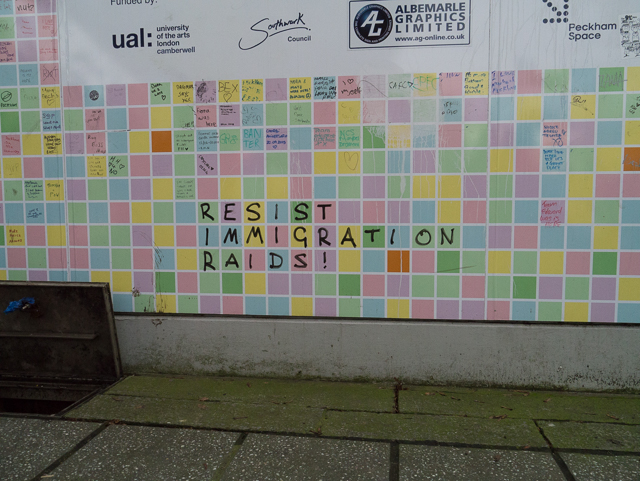
Honouring Pride’s tradition of radical protest, Peckham Pride was co-organised by three activist groups: Lesbians and Gays Support the Migrants (LGSM), Movement for Justice by Any Means Necessary and South East London Sisters Uncut. The groups differ in focus, but stand together in fighting for those “persecuted and maligned by the mainstream media.”
The day started with a free community breakfast and placard-making session coordinated by the south-east London branch of Sisters Uncut, a feminist collective focused on taking direct action against cuts to domestic violence services. Alongside well-publicised actions like their storming of the Suffragette premiere in 2015 and sit-ins on bridges across the UK, Sisters Uncut have collaborated on a number of protests in support of migrant women.
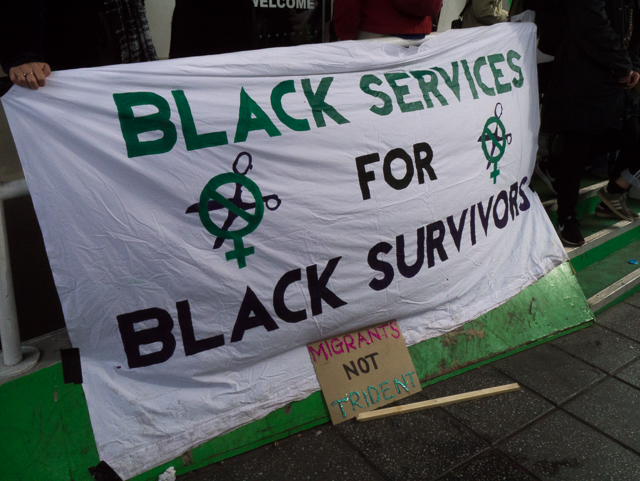
People soon began to gather at the meeting point outside Peckham Library. Some had personal experience with Britain’s immigration system, while others were there to express solidarity and protest wider discrimination against QTIPOC. Members of Movement for Justice, a long-established grassroots organisation fighting for civil and immigrant rights in the UK, posed for photos and spoke to the quickly growing crowd. By the time the march was ready to set off, hundreds had arrived to show their support.
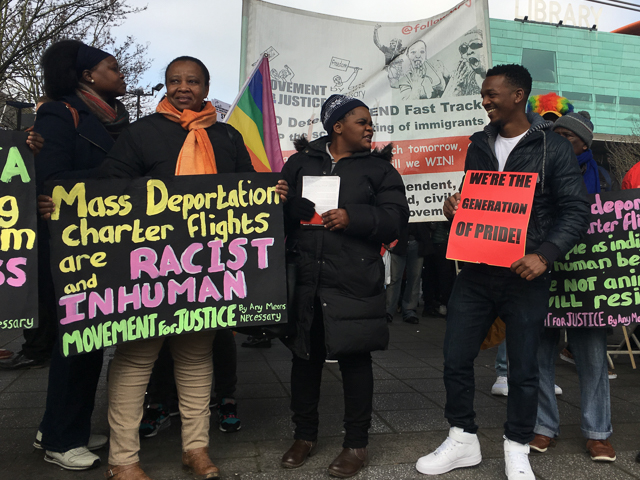
East and south-east London, with their large and diverse immigrant populations, have borne the brunt of the Conservative government’s anti-immigration measures; the number of immigration raids in the capital rose by 80% between 2010 and 2015 to almost 11 a day, with Peckham alone seeing 349 raids over the five years. The area is home to one of the largest Black communities in Britain. This makes undocumented residents a prime target for deportation charter flights, secretive late-night flights which have seen thousands of immigrants targeted by nationality, separated from friends and family, shackled, subjected to racist abuse and forcibly removed from the UK.
Many LGBTQ asylum seekers whose claims have been denied – frequently for spurious reasons, such as the recent case of a gay Nigerian asylum seeker who was scheduled to be deported on a charter flight after a letter inviting him to an appointment with immigration officials was sent to the wrong address – are forced onto these flights and deported to countries where their lives are at risk.
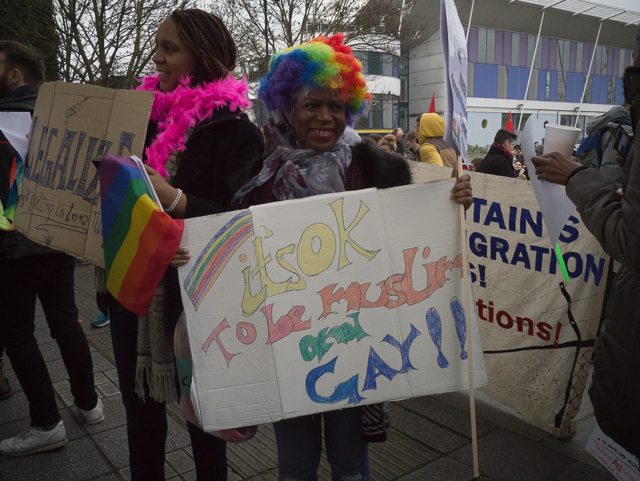
Lesbians and Gays Support the Migrants — the organisation’s name is an homage to eighties activist group Lesbians and Gays Support the Miners, and membership is open to all LGBTQAI identifying people, regardless of their sexuality — was formed in 2015 to combat the right-wing narrative that buoys the government’s attacks on immigrants and the LGBTQ community alike, as well as provide practical solidarity and support to self-organised migrant groups. “We can’t fight for rights in isolation,” LGSM member Ida-Sofie Picard told Time Out before the march, “LGBT rights depend very much on migrant rights. We’re much stronger united.”
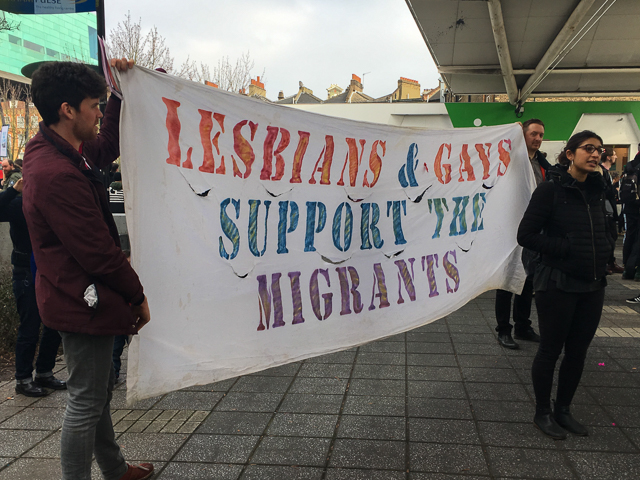
The sound of protest drums joined the typical Saturday afternoon street preachers and market traders as the march made its way down Rye Lane, Peckham’s main shopping street. Members of LGSM, Movement for Justice and Sisters Uncut headed the march, leading the crowd in chants of “We are Black, white, Muslim and we’re gay” and “Tear down defences and open the borders”.
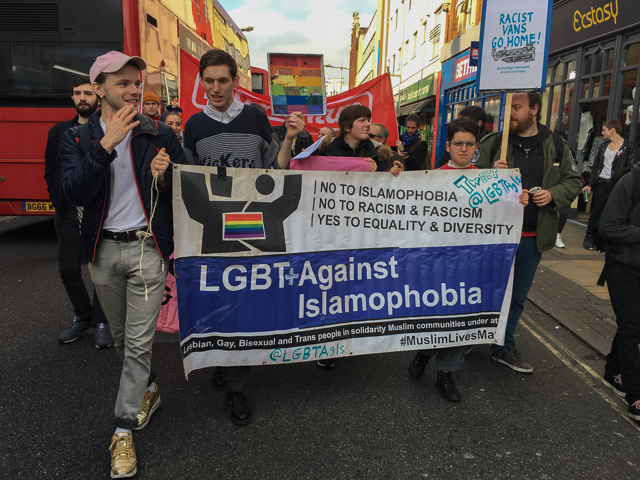
Peckham Pride is part of a rising tide of grassroots resistance to immigration raids across the UK. From Belfast to Bristol, locals have been working for years to protect undocumented members of their community. Peckham itself has seen immigration officials chased away by large crowds when attempting to conduct raids. And the Conservative government’s attempts over the past few years to extend border enforcement into everything from healthcare and education to employment and accommodation has provoked widespread outcry, with much of their proposed legislation ending up quietly shelved.
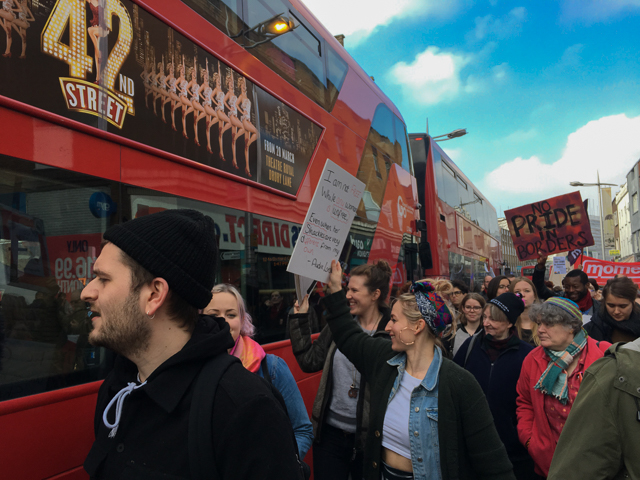
However, Britain remains gripped by racism and xenophobia. Hate crimes soared in the months following last year’s EU referendum, violence fuelled by, in the words of a report published last year by the European Commission against Racism and Intolerance, “considerable intolerant political discourse focusing on immigration.” Peckham is no exception to this climate of fear and division. Though local shopkeepers and bus drivers stuck in the march left their work to join us as we passed by – two Peckham residents even leaned out their window to shower the crowd with glitter – my girlfriend and I were at one point cornered by an enraged passerby, who took offence at “our lots'” opposition to Brexit. And while most of the march’s attendees could be found celebrating at the official after-party, many spent the evening outside Walworth Police Station instead, protesting police racism after a black taxi driver was arrested for reckless driving near the march.
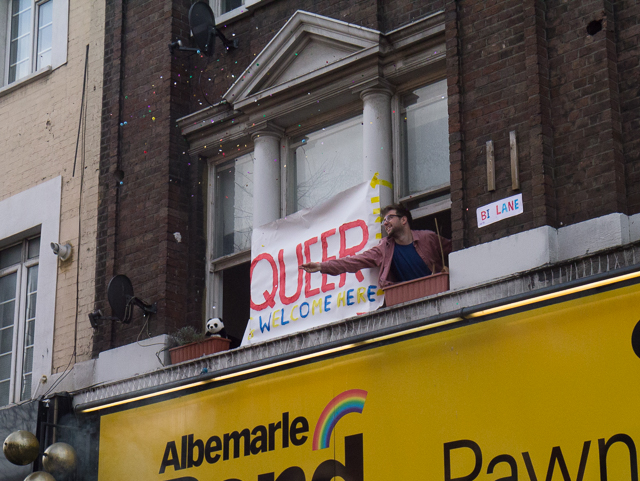
The march finished at a local art gallery, decked out for a free-for-all dance party highlighting QTIPOC and queer migrant performers. The day’s message covered the walls, in the form of the giant banner LGSM had dropped from Vauxhall Bridge in January as part of a UK-wide protest against President Trump’s inauguration – “QUEER SOLIDARITY SMASHES BORDERS.”

Pride has always been a protest, but that ideal has been lost to many after decades of commercialisation and de-politicisation. Peckham Pride was a vital testament to the power of a radical queer community and a Pride true to the movement’s origins. When the far-right attacks, we all suffer, and it’s our duty to fight back. Queer solidarity is powerful force – it’s time for us to wield it.
